Topics
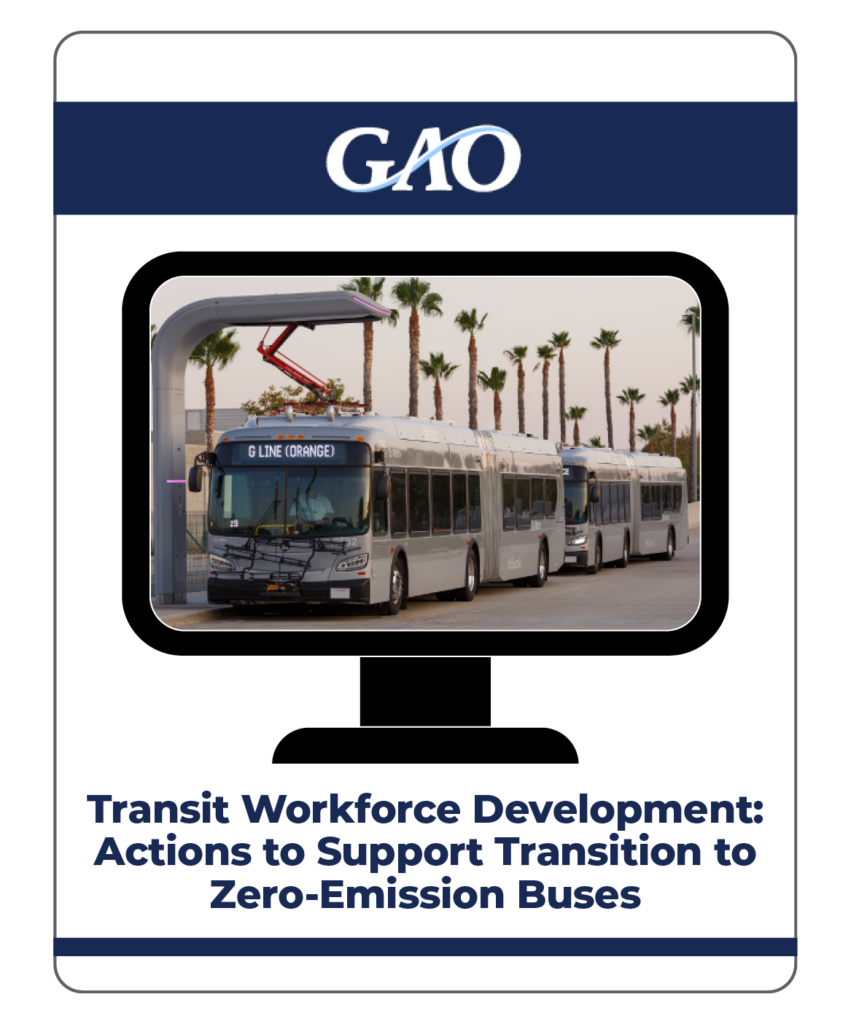
Transit Workforce Development: Actions to Support Transition to Zero-Emission Buses
U.S. Government Accountability Office
December 2024
After data analysis and expert interviews, GAO published this report which describes: (1) the status of transit agencies’ transition to zero-emission bus fleets and any challenges they may face meeting transition goals; (2) skill- and workforce-development needs of transit agencies and actions selected agencies are taking to address any workforce gaps; and (3) recommended FTA actions to assist transit agencies in preparing their workforces for zero-emission buses.
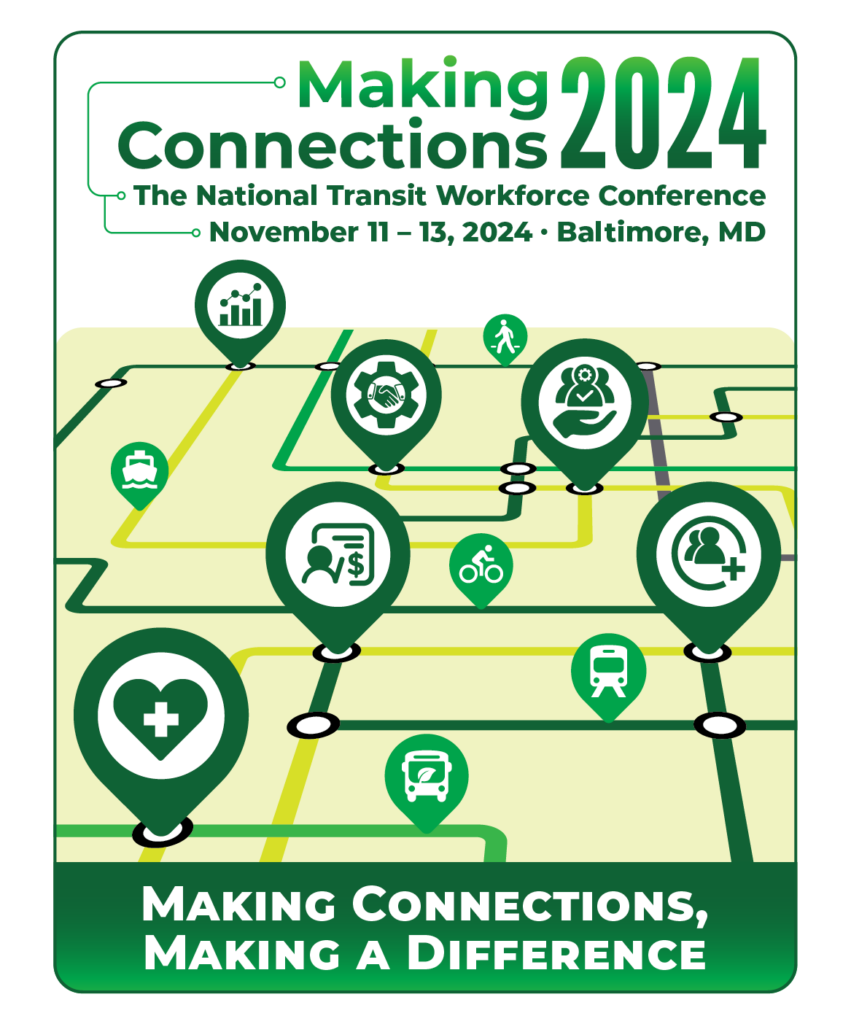
Making Connections 2024 – Creative Uses of Workforce Development Funding – Scalable Options for Agencies of All Sizes
This session about workforce development funding was presented as part of TWC’s Making Connections 2024 transit workforce conference in November, 2024.
Transit Workforce Center
November 2024
Session Description: Providing structured workforce development programs for frontline public transit workers is of critical importance for transit agencies as they work to retain employees, integrate new technologies, and fill vacant positions. Attendees of this session learned how to use funding available to transit agencies for workforce development, such as the additional funding awarded for zero-emission projects under the Low-No/Bus and Bus Facilities grant program, and heard from agencies about how they have utilized grant funds and other FTA funding to develop and implement training programs.
Moderator:
- Karitsa Holdzkom: Senior Policy Analyst – International Transportation Learning Center / Transit Workforce Center
Speakers:
- Zachary Bodle: Assistant Business Agent Maintenance – Amalgamated Transit Union Local 265 (CA)
- John Bodnar: Director, Office of Transit Programs – Federal Transit Administration
- Jason Macumber: Senior Advisor of Workforce Development and Technology – International Transportation Learning Center / Transit Workforce Center
- Steve Jovel: Operations Manager, Workforce Development – Santa Clara Valley Transportation Authority (VTA)
- Jeff Rosenberg: Director of Government Affairs – Amalgamated Transit Union
- Mauro Varela: Treasurer – Amalgamated Transit Union Local 1277 (CA)
- Kristin Warsinski: CEO – Riverside Transit Agency (CA)

Making Connections 2024 – How Do Technicians Learn? Exploring Successful Approaches for Developing Skills
This session about training transit technicians was presented as part of TWC’s Making Connections 2024 transit workforce conference in November, 2024.
Transit Workforce Center
November 2024
TOPICS: Apprenticeship , Making Connections Conference , Mentorship , Training , Zero Emission Buses
Session Description: This session delved into the most effective methods for training technicians to maintain today’s fleets of complex technology. We focused on proven strategies, such as starting with the fundamentals and progressing to hands-on training. Additionally, we discussed the value of mentorship and apprenticeship to facilitate the retention of the trained frontline workforce.
Moderator:
- Jason Macumber: Senior Advisor of Workforce Development and Technology – International Transportation Learning Center / Transit Workforce Center
Speakers:
- Russell Anderson: Director Bus Maintenance Training – California Transit Works!
- Staci Hanna: Maintenance Training Manager – TriMet
- Brian Markey: Chief Executive Officer – Custom Training Aids Inc.
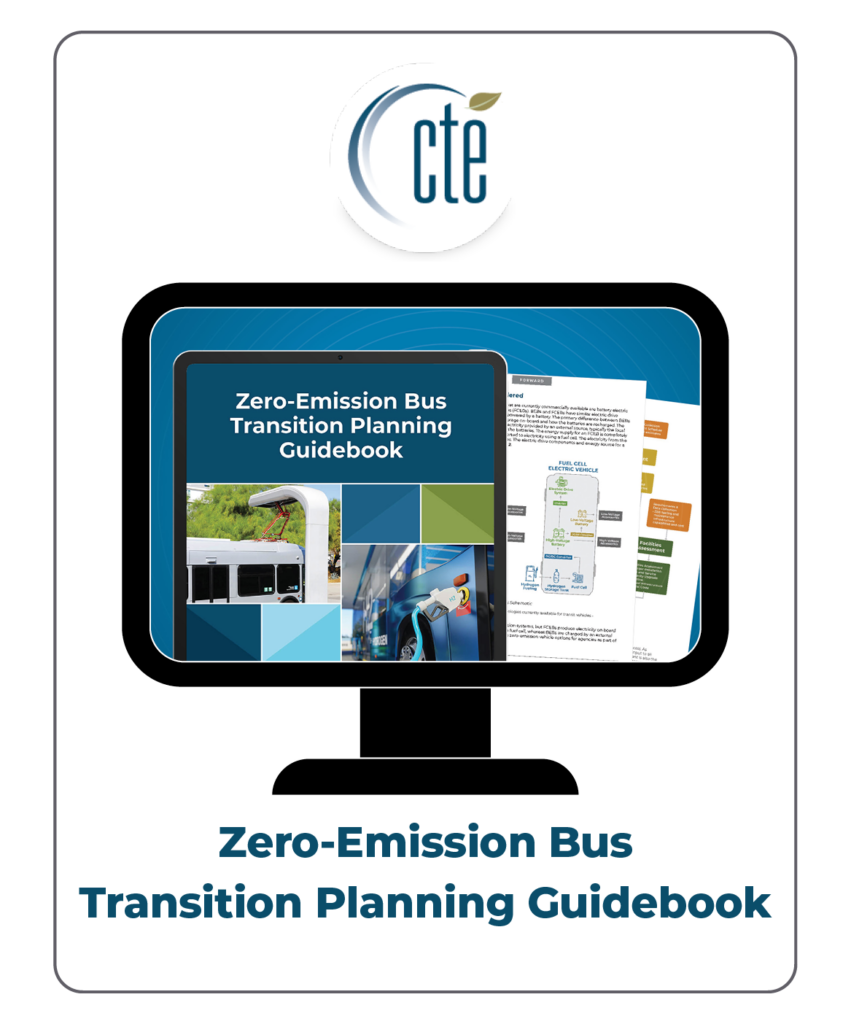
Zero-Emission Bus Transition Planning Guidebook
The Center for Transportation and the Environment
November 2024
TOPICS: Policy and Planning , Procurement , Zero Emission Buses
Transitioning to a ZEB fleet requires thorough planning and consideration of the elements that are unique to ZEBs, such as range limitations, higher vehicle costs, charging and/or hydrogen infrastructure, and operator and maintenance workforce development. Failing to plan around these issues may result in added costs for bus and infrastructure purchases, project delays, service concerns, and operational challenges as ZEBs become a larger and larger portion of the fleet.
A properly developed ZEB Transition Plan can help overcome these challenges. This Guidebook is intended to give public transit fleet operators the knowledge necessary to plan for a full fleet transition to zero-emission technologies with a ZEB Transition Plan.

Making Connections 2024 – Plan, Train, Succeed: Building Your ZEV Workforce Transition Strategy
This session about transitioning the transit workforce to zero-emission vehicles was presented as part of TWC’s Making Connections 2024 transit workforce conference in November, 2024.
Transit Workforce Center
November 2024
Session Description: As the transit industry accelerates toward zero-emission vehicle (ZEV) adoption, a comprehensive workforce strategy is essential for a successful transition. This session focused on creating effective plans for workforce development, implementing targeted training programs with an emphasis on safety, and ensuring long-term success in transitioning to ZEVs. Attendees learned about applied research, innovative training solutions, and technical assistance designed to help transit agencies develop a skilled workforce equipped to support zero-emission technologies.
Moderator:
- Jason Macumber: Senior Advisor of Workforce Development and Technology – International Transportation Learning Center / Transit Workforce Center
Speakers:
- Eliseo Acosta Jr: Workforce Development Coordinator – Amalgamated Transit Union
- Mark Finnicum: Chief Operation Officer – Stark Area Regional Transit Authority
- Molly King: Deputy Associate Administrator for Research, Demonstration, and Innovation – Federal Transit Administration
- Jennifer Sweten: Director of Operations – Missoula Urban Transportation District
- Billy Terry: Director – National Transit Institute (NTI)

Making Connections 2024 – Zero In and Power Up: Resources for a Smooth Workforce Transition to Zero-Emission Vehicles
This full-day intensive session about transitions the transit workforce to zero-emission vehicles was presented as part of TWC’s Making Connections 2024 transit workforce conference in November, 2024.
Transit Workforce Center
November 2024
Session Description: Currently managing or expecting to begin the process of transitioning part of your fleet towards electrification? Transitioning from work with the 12- and 24-volts electrical systems in traditional diesel and CNG buses to Zero Emissions Buses (ZEBs), with upwards of 800 volts, requires a significant commitment to additional skills training and development for new and incumbent transit technicians. As a central component of a nationally-coordinated effort to help prepare frontline technicians with the training needed to meet the challenges and demands of this new technology, TWC has developed a Battery Electric Bus (BEB) familiarization course, currently delivered in partnership with National Transit Institute. This full-day session combined an in-depth introduction to key elements of the course resources, freely available to all, followed by an afternoon technical tour of a nearby ZEB maintenance facility.
Moderator:
- Jason Macumber: Senior Advisor of Workforce Development and Technology – International Transportation Learning Center / Transit Workforce Center
Speakers:
- Brandon Liu: Instructional Designer – International Transportation Learning Center / Transit Workforce Center
- Brian Markey: Chief Executive Officer – Custom Training Aids Inc.
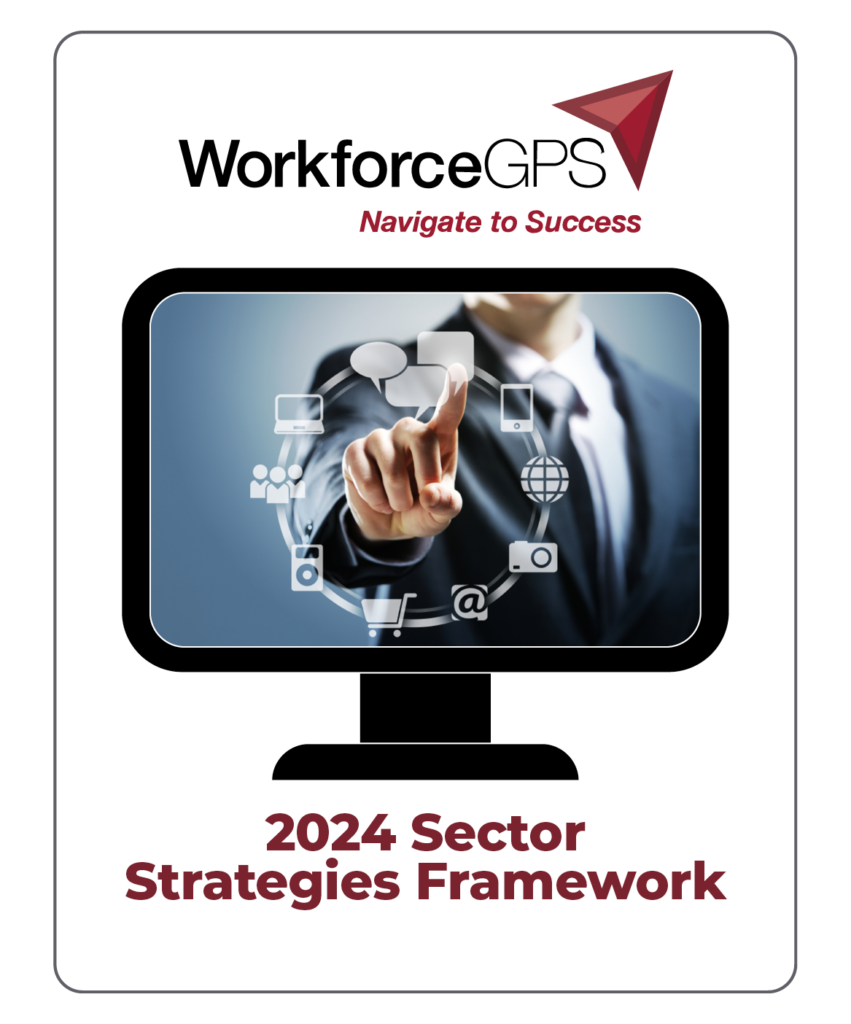
2024 Sector Strategies Framework
WorkforceGPS
September 2024
In September 2024, ETA released an updated Sector Strategies Framework to guide national, state, and local practitioners in their efforts to launch and implement effective sector strategies. The Framework is intended to advance knowledge and support the development, scaling, and sustainability of sector strategies. It provides workforce system practitioners with a clear picture of the concepts and elements essential to the successful implementation of sector partnerships and sector strategies. The Sector Strategies Framework was developed by ETA to harness lessons learned from the field, provide support to overcome common barriers, and help practitioners build knowledge in new areas.
Along with the Framework, the ETA released additional resources including:
- Implementation Guide and Self-Assessment and Action Planning Tool: Resources to help practitioners implement the Framework and assess and strengthen existing sector strategies efforts.
- ETA Blog Post: “Demand-driven training: Reimagining sector partnerships to build career pathways”
- Training and Employment Notice No. 08-24: Release and Availability of Updated 2024 U.S. Department of Labor’s Sector Strategies Framework
- Virtual Training Series: Learn more about the Framework and strategies to implement and scale sector strategies by viewing each session in this three-part series.
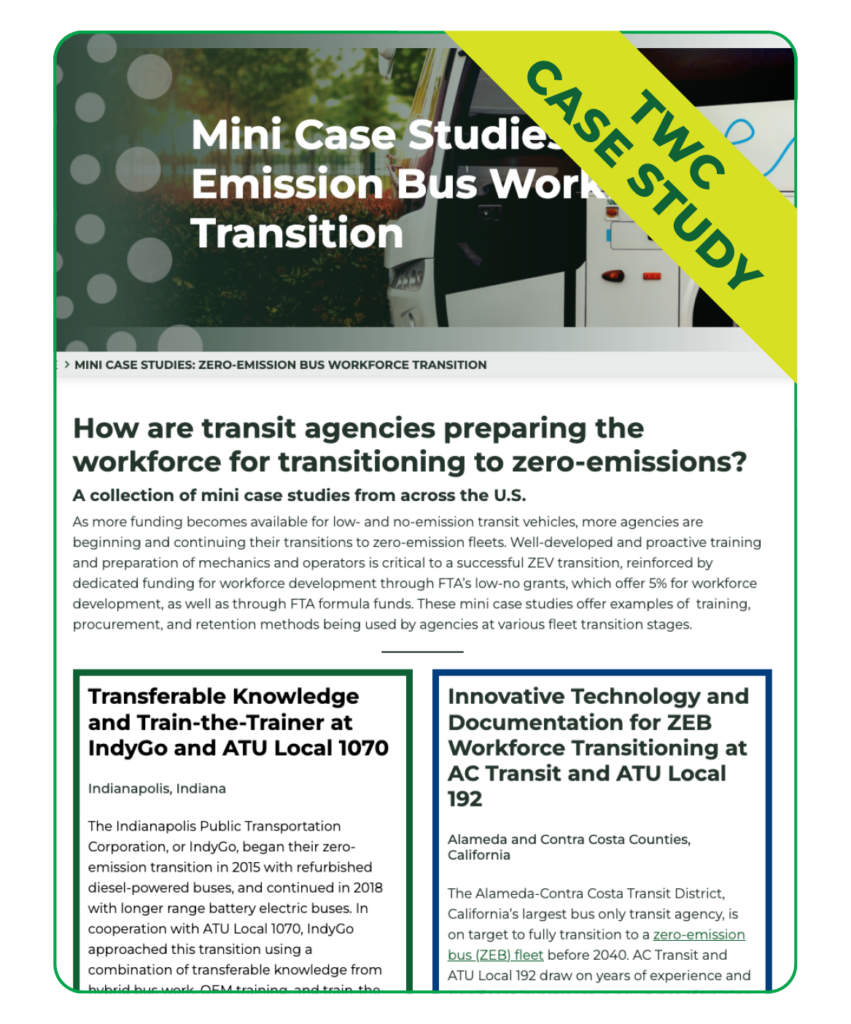
Mini Case Studies: Zero-Emission Bus Workforce Transition
Transit Workforce Center
August 2024
As more funding becomes available for low- and no-emission transit vehicles, more agencies are beginning and continuing their transitions to zero-emission fleets. Well-developed and proactive training and preparation of mechanics and operators is critical to a successful ZEV transition, reinforced by dedicated funding for workforce development through FTA’s low-no grants, which offer 5% for workforce development, as well as through FTA formula funds. These mini case studies offer examples of training, procurement, and retention methods being used by agencies at various fleet transition stages.
- Transferable Knowledge and Train-the-Trainer at IndyGo and ATU Local 1070
- Innovative Technology and Documentation for ZEB Workforce Transitioning at AC Transit and ATU Local 192
- Transitioning Operators Through Pre-Apprenticeship, Apprenticeship, and Mentorship at Golden Gate Transit and ATU Local 1575
- Frontline Worker Involvement in ZEB Transitioning at SporTran and ATU Local 588
- Midwest Hydrogen Center of Excellence at SARTA and AFSCME Local 1880
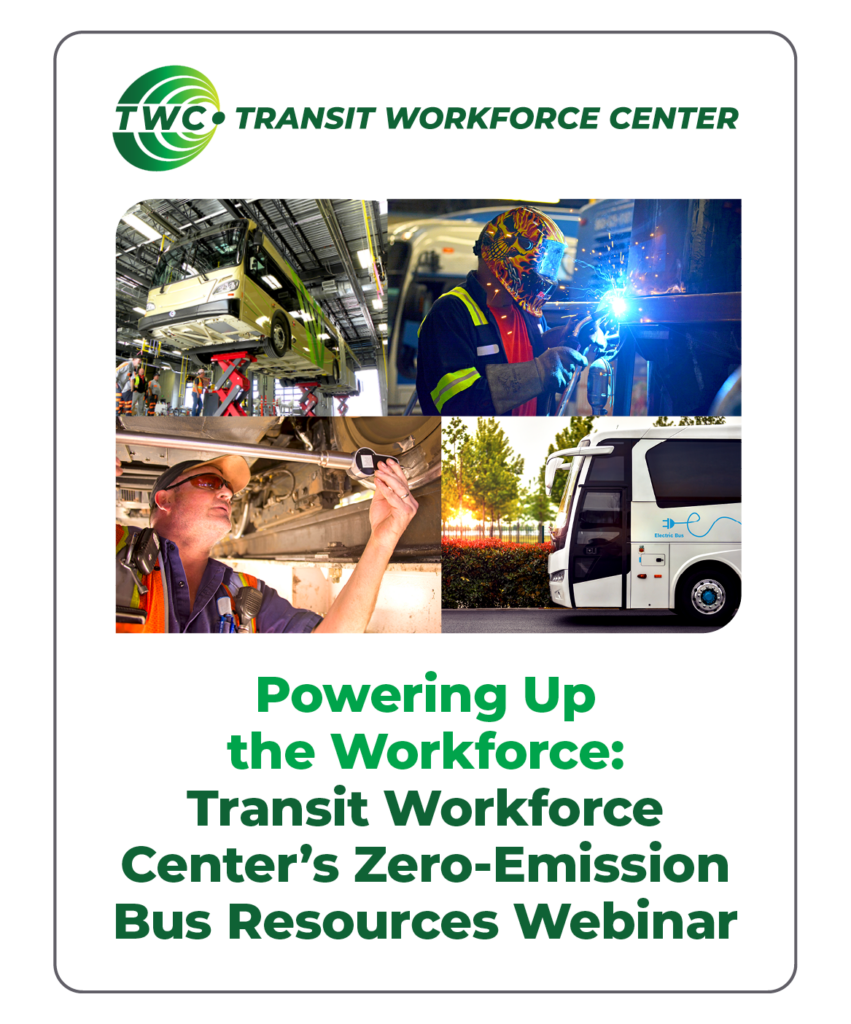
Powering Up the Workforce: Transit Workforce Center’s Zero-Emission Bus Resources Webinar
A safe and successful transition to zero-emission vehicles requires a significant commitment to additional workforce skills, training, and development. This webinar showcases the tools and resources TWC makes available to help frontline technicians meet the challenges and demands of ZEB technology. Hear from and enjoy this interactive discussion with TWC, the Federal Transit Administration, the National Transit Institute, and the American Public Transportation Association.
Transit Workforce Center
June 2024
TOPICS: Zero Emission Buses
Below, you will find the link to the full slideshow used during the webinar as well as other useful resources.
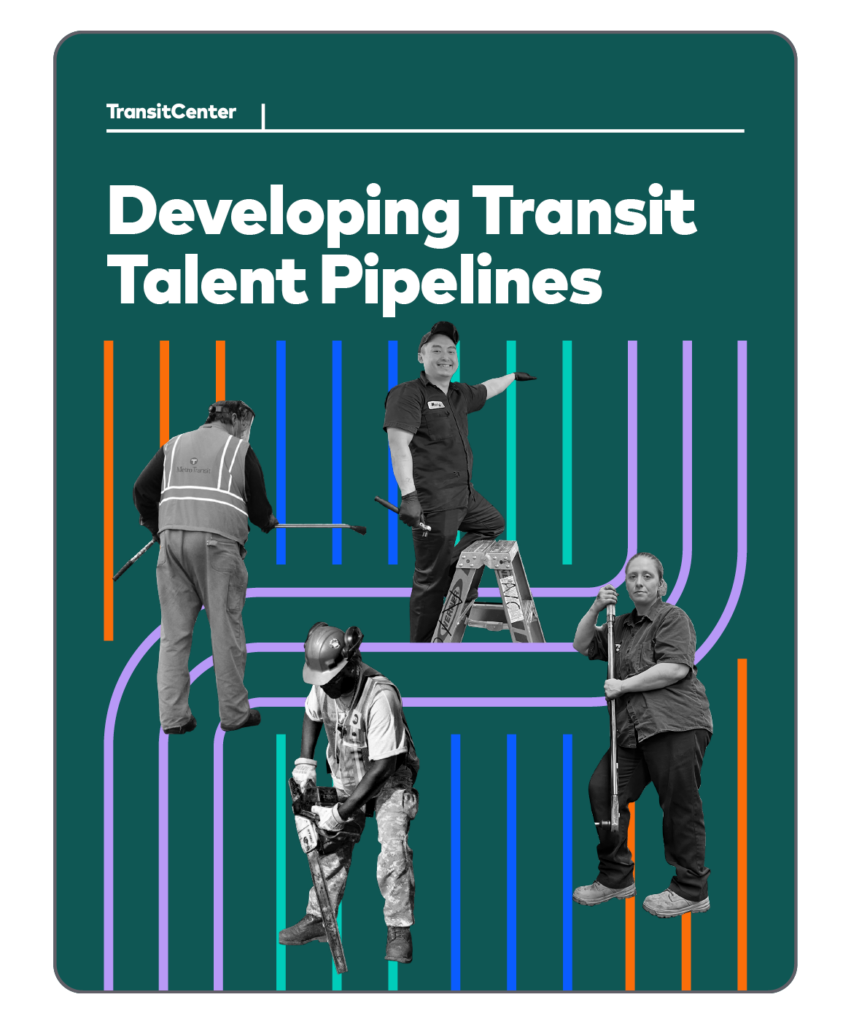
Developing Transit Talent Pipelines
TransitCenter’s report explores the workforce challenges of transit bus mechanics and maintenance workers, which are essential for transitioning to zero-emissions buses and restoring pre-pandemic service. Agencies are struggling to maintain a steady pipeline for these positions due to retirements, attrition, and a changing labor market. The report determines that agencies should engage more actively with potential workers and encourage them to join the transit workforce, as well as finding new ways to prepare new workers and retrain current workers to meet current and future needs, particularly as technology for zero-emission buses continues to change and grow more widespread. The report recommends greater investment from transit agencies, state and federal government, and philanthropy to support transit jobs.
TransitCenter
May 2024
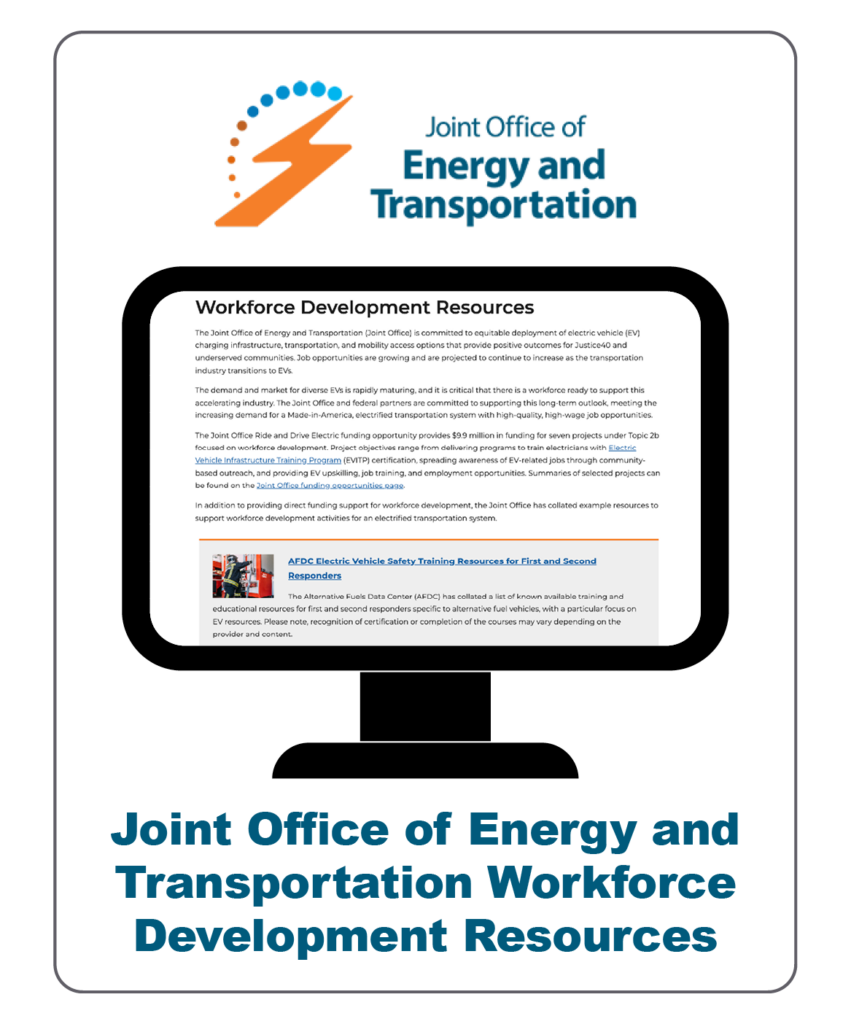
Joint Office of Energy and Transportation Workforce Development Resources
The Joint Office of Energy and Transportation (Joint Office) supports the deployment of zero-emission, convenient, accessible, and equitable transportation infrastructure. In addition to providing direct funding support for workforce development, the Joint Office has collated example resources to support workforce development activities for an electrified transportation system.
Joint Office of Energy and Transportation
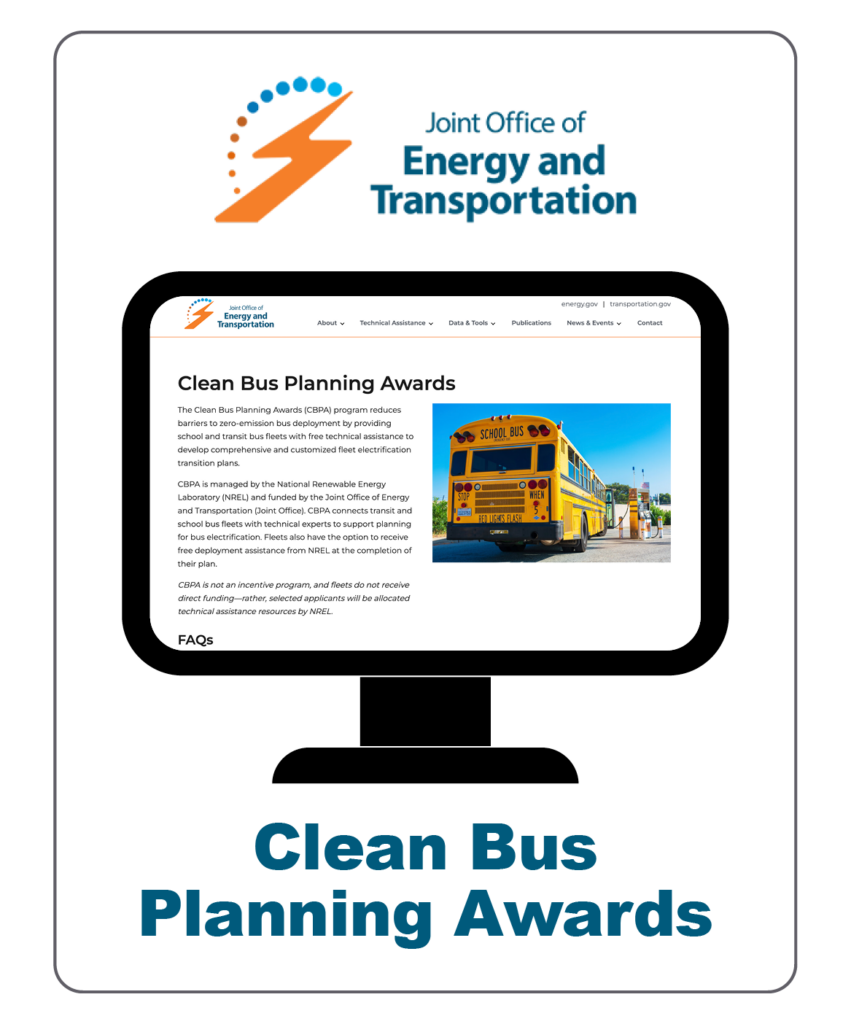
Clean Bus Planning Awards
The Clean Bus Planning Awards (CBPA) program reduces barriers to zero-emission bus deployment by providing school and transit bus fleets with free technical assistance to develop comprehensive and customized fleet electrification transition plans. Applications may be submitted on a rolling basis.
Joint Office of Energy and Transportation, National Renewable Energy Laboratory
February 2024
TOPICS: Policy and Planning , Zero Emission Buses
CBPA is not an incentive program, and fleets do not receive direct funding—rather, selected applicants will be allocated technical assistance resources by NREL.
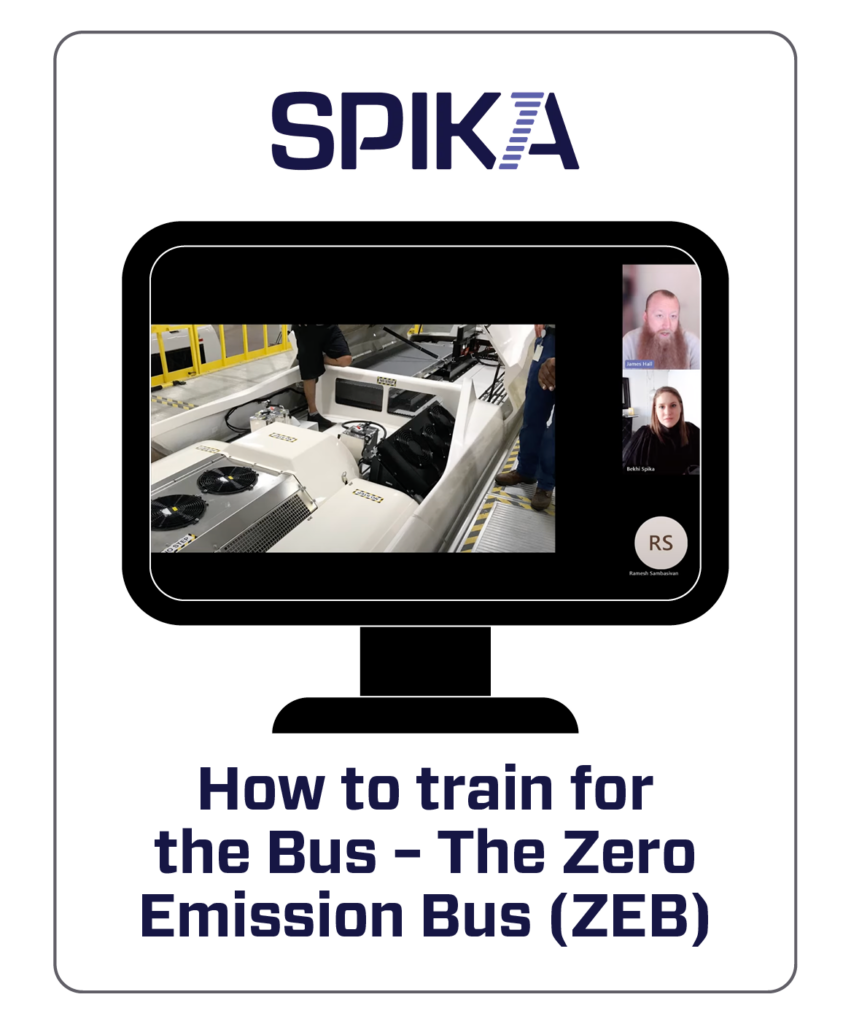
How to train for the Bus – The Zero Emission Bus (ZEB)
In this video, James Hall, Principal & Founder of ZEB Tech, and Bekhi Spika, Vice President & Chief Revenue Officer of Spika Design & Manufacturing, have a conversation about transitioning and training the transit workforce for zero-emission buses.
Spika Design & Manufacturing
February 2024
TOPICS: Training , Zero Emission Buses
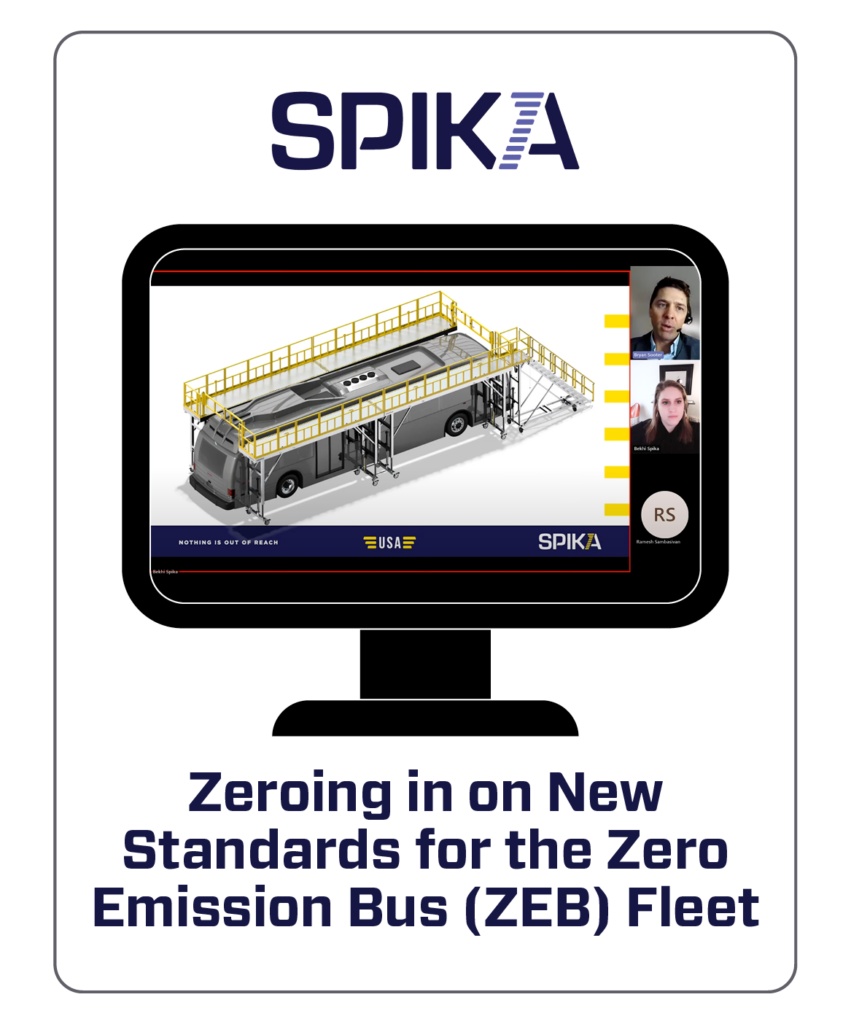
Zeroing in on New Standards for the Zero Emission Bus (ZEB) Fleet
In this video, Bryan Sooter, P.E., Director of Standards at the American Public Transportation Association (APTA), and Bekhi Spika, VP and CRO of Spika Design & Manufacturing, have a conversation about ZEB standards, including how standards are created in public transportation; the challenges faced by transit agencies in getting prepared for an entirely new way of operating with entirely new technology in existing, new or modified infrastructure; the kinds of areas that new standards on ZEB can be expected to encompass; and the guidance on resources available from APTA for transit agencies shifting to ZEB fleets.
Spika Design & Manufacturing
February 2024
TOPICS: Policy and Planning , Training , Zero Emission Buses
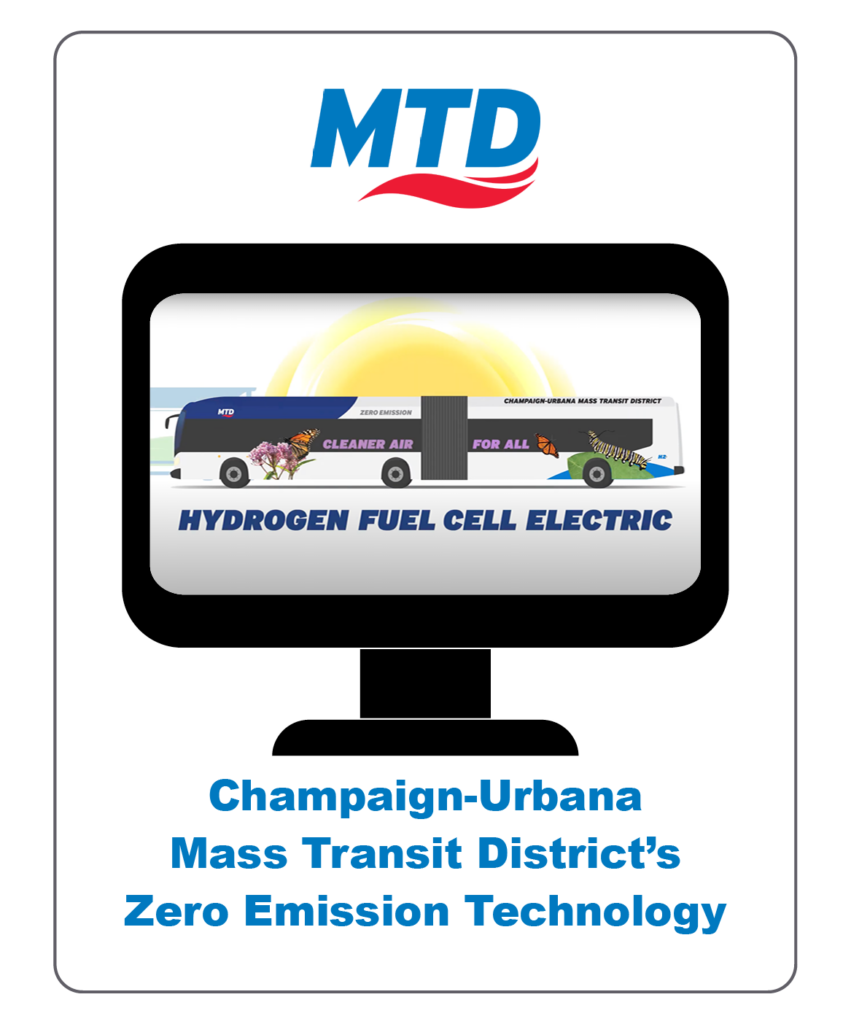
Champaign-Urbana Mass Transit District’s Zero Emission Technology
Check out Champaign-Urbana Mass Transit District’s (MTD) zero emission technology! In these videos, MTD unveils their zero-emission buses and their work to use fully solar-produced hydrogen.
Champaign-Urbana Mass Transit District
February 2024
TOPICS: Zero Emission Buses
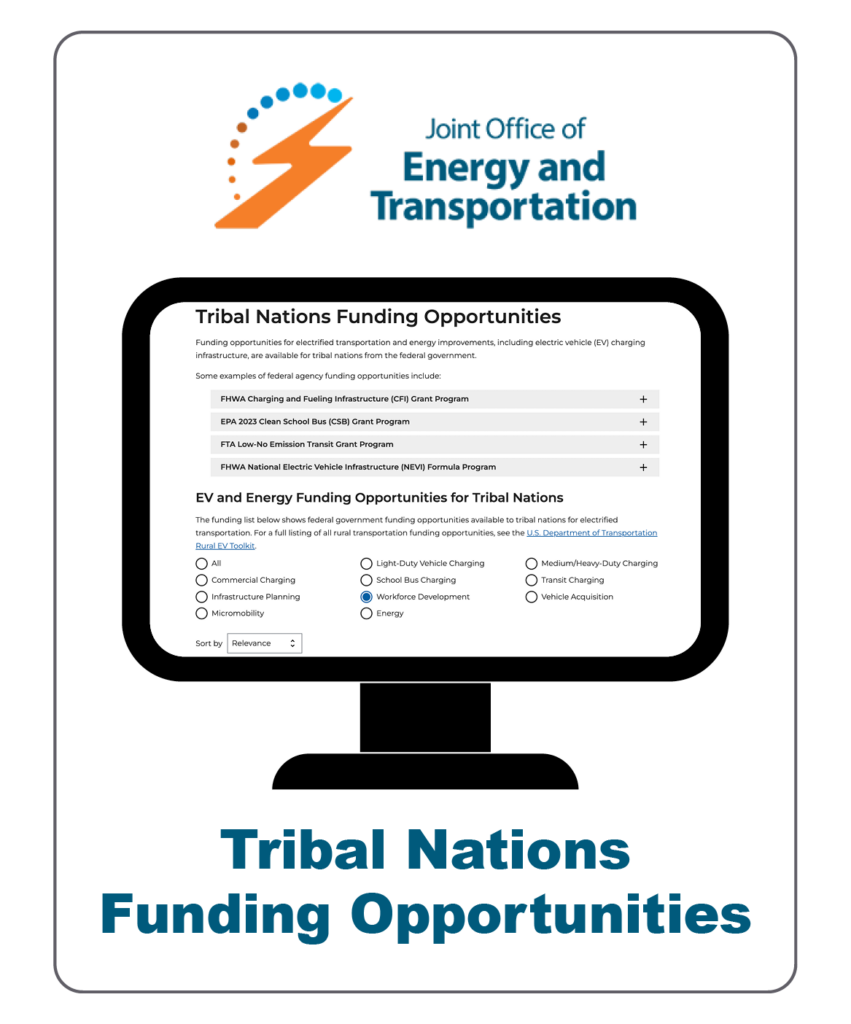
Tribal Nations Funding Opportunities
This page provides an updated and filterable list of funding opportunities for electric vehicle development in tribal nations.
Joint Office of Energy and Transportation
TOPICS: Funding Opportunities , Zero Emission Buses
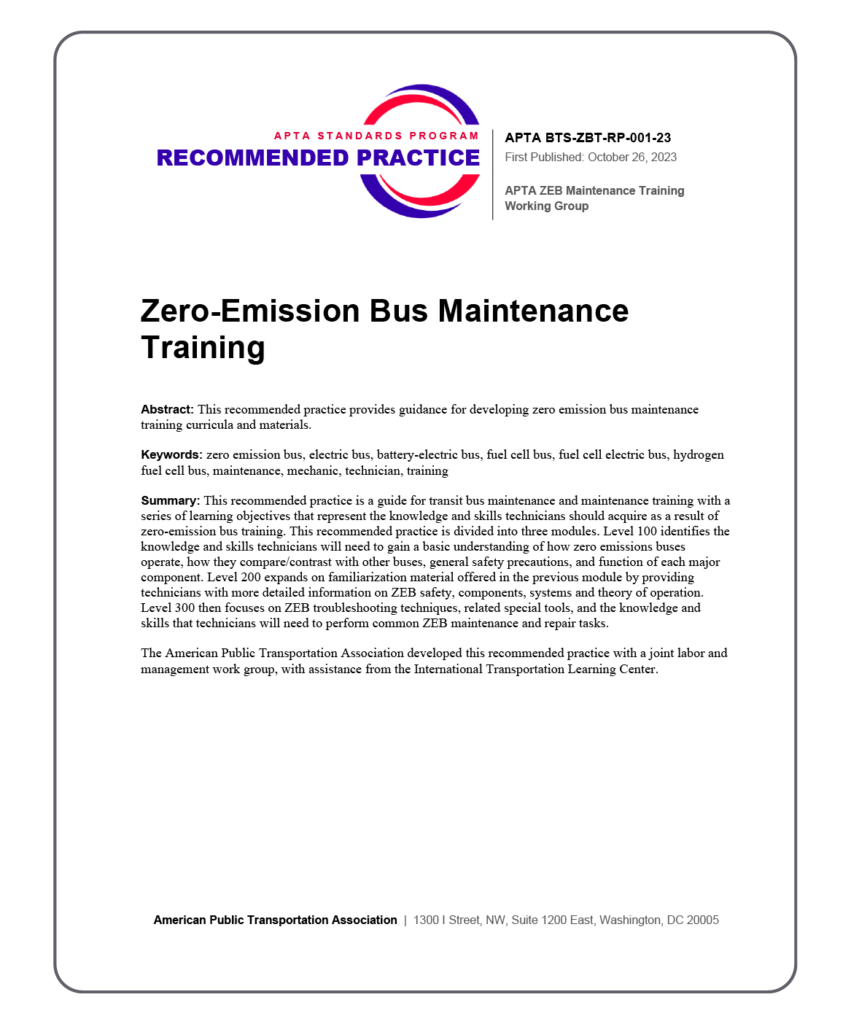
Zero-Emission Bus Maintenance Training Standards
This recommended practice provides guidance for developing zero emission bus maintenance training curricula and materials.
American Public Transportation Association
October 2023
TOPICS: Training , Zero Emission Buses
This recommended practice is a guide for transit bus maintenance and maintenance training with a series of learning objectives that represent the knowledge and skills technicians should acquire as a result of zero-emission bus training. This recommended practice is divided into three modules. Level 100 identifies the knowledge and skills technicians will need to gain a basic understanding of how zero emission buses operate, how they compare/contrast with other buses, general safety precautions, and function of each major component. Level 200 expands on familiarization material offered in the previous module by providing technicians with more detailed information on ZEB safety, components, systems and theory of operation. Level 300 then focuses on ZEB troubleshooting techniques, related special tools, and the knowledge and skills that technicians will need to perform common ZEB maintenance and repair tasks.
The American Public Transportation Association developed this recommended practice with a joint labor and management work group, with assistance from the International Transportation Learning Center.
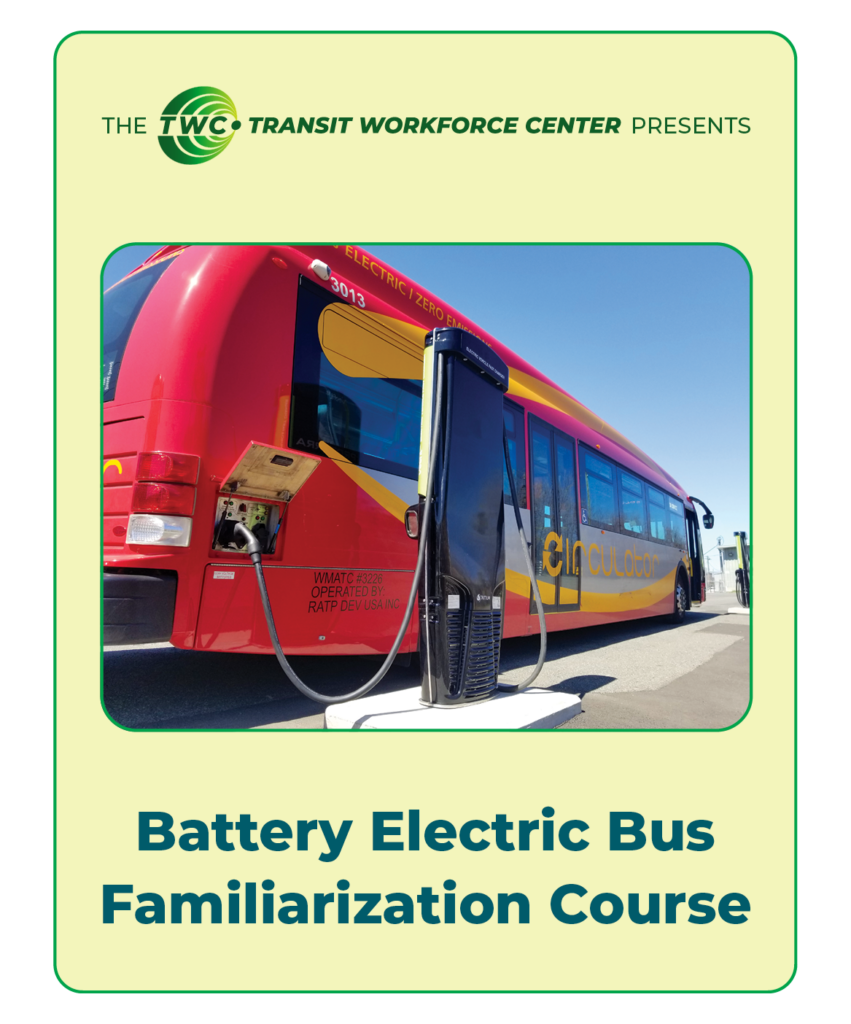
Battery Electric Bus Familiarization Course
Transit Workforce Center
September 2023
This course provides participants with an overview and familiarization to battery electric bus (BEB) basics. This will include an overview of what a BEB is, and what makes it both similar and different from its standard transit counterparts. The course will include sections on BEB components and systems, details on its internal functions (CAN, High Voltage systems, battery packs, etc.), the management systems, and a quick glance at preventive maintenance tasks. The course will follow up with a module on some electrical fundamentals, safety features, considerations, risk and hazard assessment, PPE, and comes with demonstrations of actual technicians performing de-energization (LOTO) of a Proterra and New Flyer model bus, and concludes with the third module introducing details involved with BEB charging, including the details of current BEB charging technologies, emerging charging technologies and opportunities, electric vehicle charging standards, and common considerations in charging maintenance and charger safety precautions.
Disclaimer : This course is intended only as informal guidance on the matters addressed, and should not be relied upon as the sole method or manner for performing the tasks or work outlined in the materials.
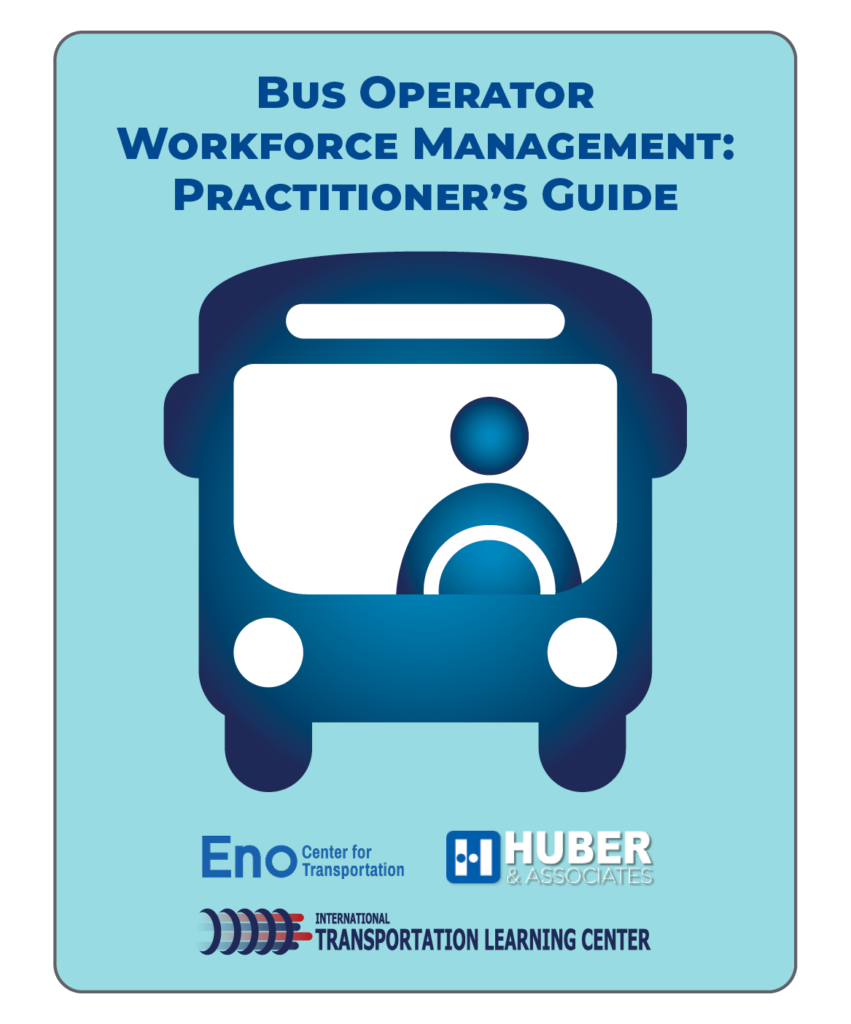
Bus Operator Workforce Management: Practitioner’s Guide
This report, produced by the Eno Center for Transportation, International Transportation Learning Center (ITLC), and Huber & Associates, is a practitioner’s guide that provides recommendations and resources enabling transit agencies to better assess, plan, and implement their operator workforce management programs. A link to a related TRB webinar is also included.
Transit Cooperative Research Program
August 2023
Contributor(s): National Academies of Sciences, Engineering, and Medicine; Transportation Research Board; Transit Cooperative Research Program; Robert Puentes; Philip Plotch; Brianne Eby; Paul Lewis; Karitsa Holdzkom; Xinge Wang; Douglas Nevins; Kenyon Corbett; Melissa Huber
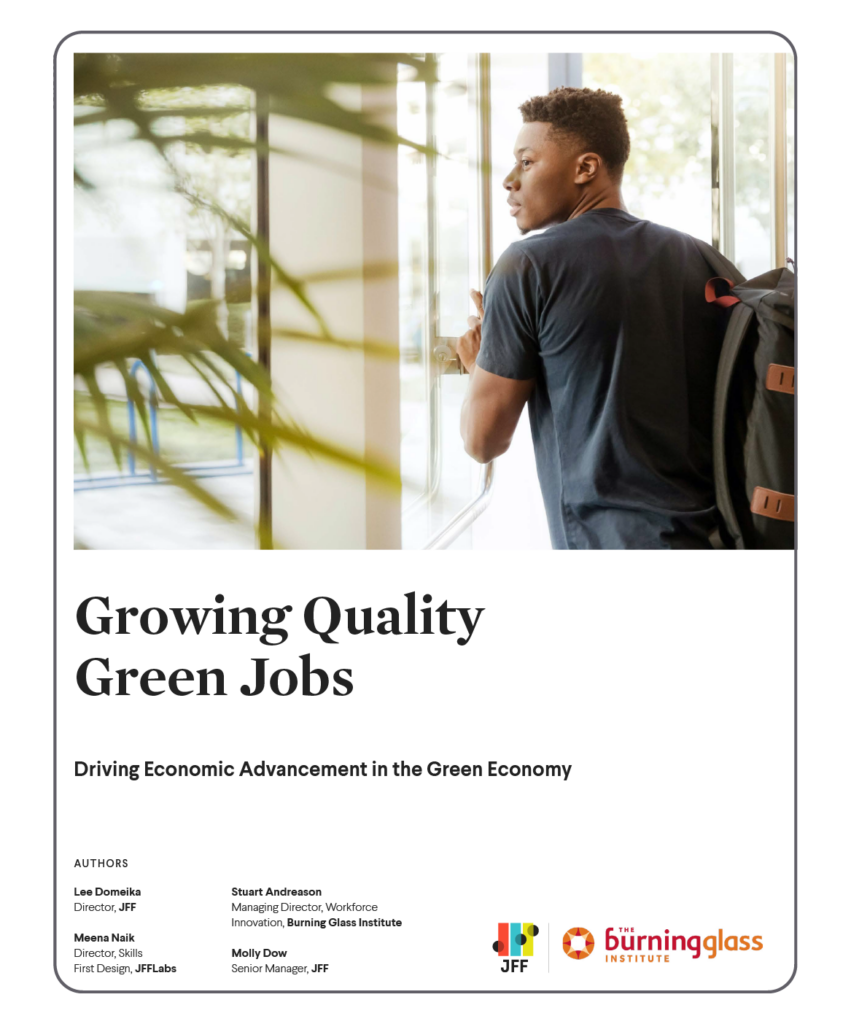
Growing Quality Green Jobs
This report describes how the US workforce is greening via the creation of new green jobs, adoption of green skills in existing jobs, and the rapid proliferation of green technologies throughout the economy, including in the transportation industry.
Burning Glass Institute, Jobs for the Future
July 2023
TOPICS: Policy and Planning , Zero Emission Buses
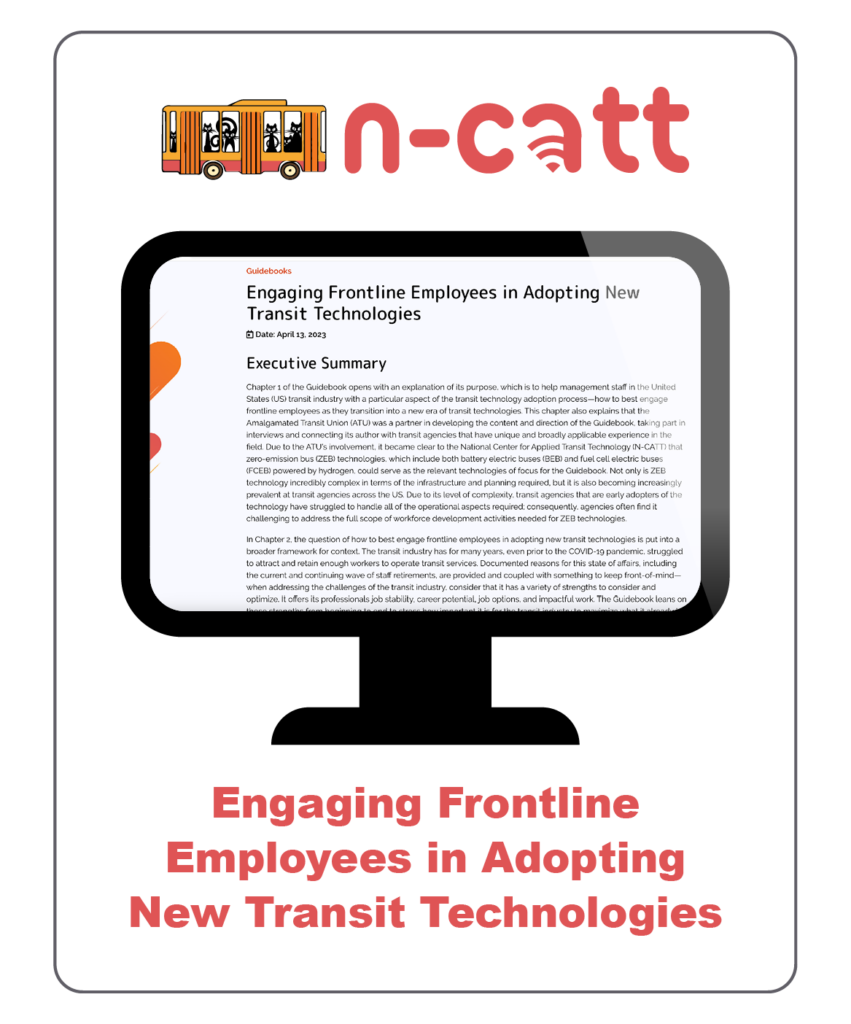
Engaging Frontline Employees in Adopting New Transit Technologies
The purpose of this guidebook, made in collaboration with the Amalgamated Transit Union (ATU), is to help management staff in the US transit industry engage frontline employees as they transition into a new era of transit technologies. The guidebook considers broader issues such as workforce shortages, provides advice and information on training frontline employees on new transit technologies, and discusses the usefulness of apprenticeships.
National Center for Applied Transit Technology
April 2023
TOPICS: Apprenticeship , Policy and Planning , Training , Workforce Shortage , Zero Emission Buses
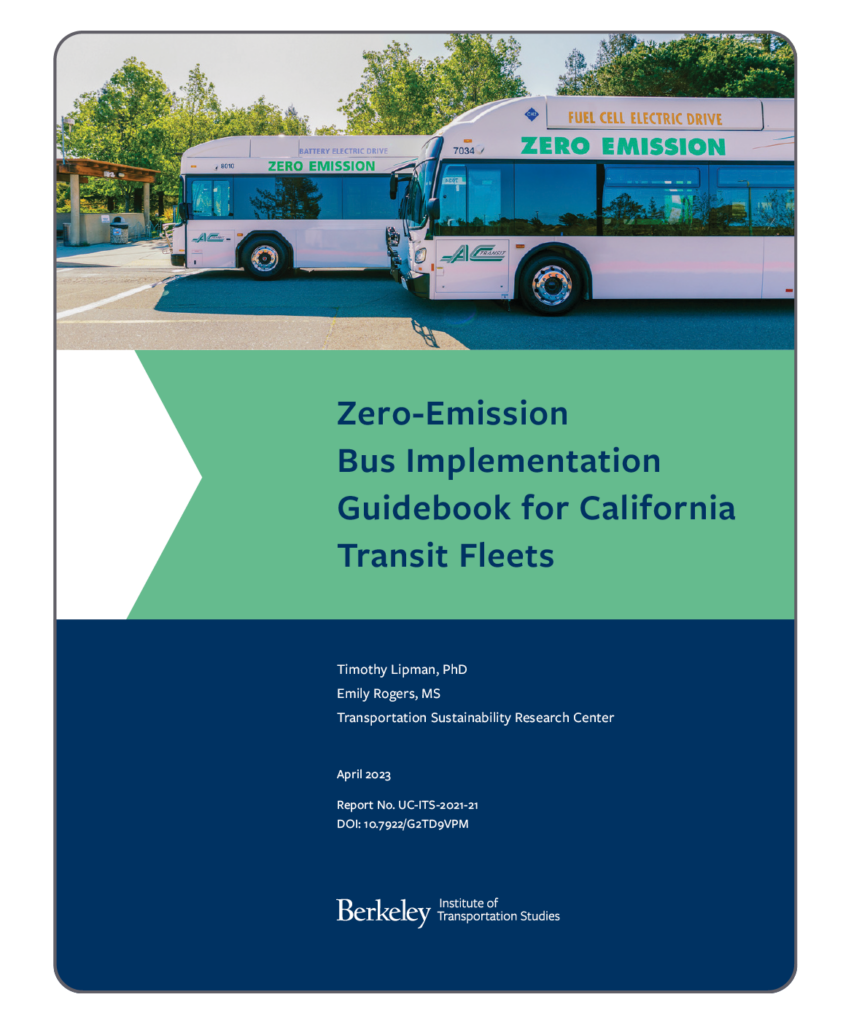
Zero-Emission Bus Implementation Guidebook for California Transit Fleets
University of California Institute of Transportation Studies
April 2023
TOPICS: Procurement , Training , Zero Emission Buses
California is in the process of state and local efforts to reduce emissions of pollutants and climate-changing gases, particularly in the transportation industry, which has been experiencing challenges due to economic conditions and the ongoing global pandemic. To address the role of transit bus operations in meeting California’s aggressive greenhouse gas (GHG) and emissions, the California Air Resources Board (ARB) has implemented an ambitious Innovative Clean Transit (ICT) regulation that requires all public transit agencies to gradually transition to a 100 percent zero-emission bus (ZEB) fleet. Beginning in 2029, 100% of new purchases by transit agencies must be ZEBs, with a goal for a full transition by 2040.
This plan provides resources and advice for transitioning to a ZEB fleet, including deployment and performance assessments, supportive policies, fueling solutions, training practices for operations and maintenance, and grant program resources. Agencies outside of California can take also take advantage of this resource, which included federal and non-governmental training programs.
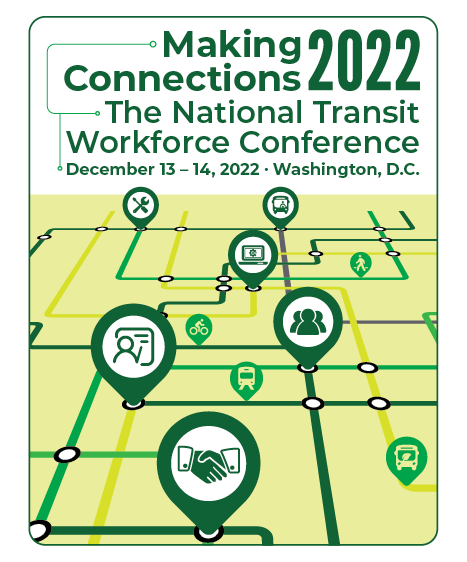
Making Connections 2022 – Conference Overview and Videos
The Transit Workforce Center hosted Making Connections 2022: The National Transit Workforce Conference in Washington, D.C. on December 13-14, 2022. This conference brought together participants from urban, suburban, rural, and tribal public transportation and industry stakeholders in plenaries, workshops, networking, and ongoing dialogue. Discussions and sessions featured topics including recruitment and retention, training, mentoring and apprenticeships, new technologies, preparing today’s and tomorrow’s workforce, and advancing diversity, equity, inclusion, and access.
Transit Workforce Center
December 2022
TOPICS: Apprenticeship , Career Pathways , Diversity, Equity, Inclusion, and Access , Hiring and Recruitment , Labor-Management Partnerships , Making Connections Conference , Mentorship , Program Evaluation and ROI , Retention , Safety and Health , Trainer and Mentor Development , Training , Zero Emission Buses
Session materials from Making Connections 2022 are hosted on the TWC Resource Center. Please click here to view all related materials. A PDF copy of the conference schedule is linked below.
Opening Video:
Recap Video:
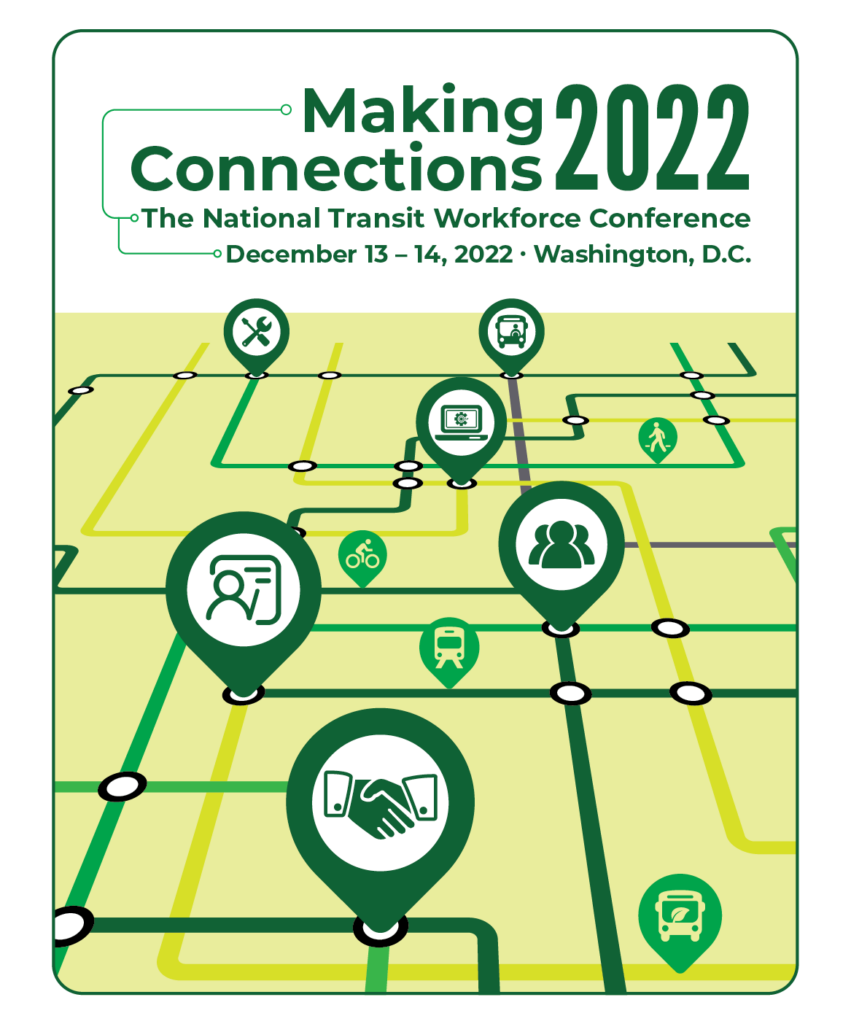
Making Connections 2022 – Engines to Inverters: Preparing Technicians for ZEB Deployment
This session about working with ZEB technologies was presented as part of TWC’s Making Connections 2022 transit workforce conference in December, 2022.
Transit Workforce Center
December 2022
Session Summary: As transit agencies integrate zero-emission technologies into their fleet, many are experiencing difficulties in preparing their frontline workforce to properly maintain and operate the equipment. In this workshop, panelists explored lessons learned, best practices, and available resources to upskill their technician and maintenance workforce and prepare the future frontline workers to safely and effectively work with ZEB technologies. Presentations by industry experts, early-adopters, and successful rollouts offered insight for an audience seeking guidance on first steps and follow-through.
Moderators
- James Hall: Program Manager, Technical Training – International Transportation Learning Center/Transit Workforce Center
- Lisa Jerram: Director of Bus Operations and New Vehicle Technologies – American Public Transportation Association
Speakers
- Joseph Gamez: Assistant Chief Maintenance Officer Maintenance Training – New York City Transit, Department of Buses
- Walter Kirkland: Service Manager – StarMetro Tallahassee
- Obed Mejia: Senior Bus Equipment Instructor – Los Angeles County Metropolitan Transportation Authority

Making Connections 2022 – Driving Bus Operator Recruitment and Retention: Challenges, Opportunities and Innovation
This session about bus operator recruitment and retention was presented as part of TWC’s Making Connections 2022 transit workforce conference in December, 2022.
Transit Workforce Center
December 2022
Session Summary: A headline issue confronting all transit systems today – how to attract and retain bus operators in a tight labor market. This lively session began with presentations from the TCRP F-28 research team and TransitCenter on their recently published national research findings on recruiting, developing and retaining transit bus operators. Labor and management industry practitioners from multiple locations then shared their recruitment approaches and strategies that have been most effective on the ground, and TWC staff summarized the National Transit Frontline Worker Recruitment Campaign.
Moderator
- Rob Puentes: President and CEO – The Eno Center for Transportation
Speakers
- Julia Castillo: Executive Director – Heart of Iowa Regional Transit Agency
- James Duff: Assistant Vice President, Human Resources – Dallas Area Rapid Transit
- Jeff Hazen: Executive Director – Sunset Empire Transportation District
- Steve Jovel: Transportation Superintendent – Santa Clara Valley Transportation Authority
- Robin Phillips: Executive Director – National Rural Transit Assistance Program
- Harpreet Singh: JWI Director – Amalgamated Transit Union Local 265
- David Stephen: Senior Communications Specialist – International Transportation Learning Center/Transit Workforce Center
- Chris Van Eyken: Program Manager – TransitCenter

Making Connections 2022 – Drive to Revive: Preparing Operators for ZEB Deployment
This session about working with ZEB technologies was presented as part of TWC’s Making Connections 2022 transit workforce conference in December, 2022.
Transit Workforce Center
December 2022
Session Summary: As transit agencies integrate zero-emission technologies into their fleet, many are experiencing difficulties in preparing their frontline workforce to properly maintain and operate the equipment. In this workshop, panelists explored lessons learned, best practices, and available resources to upskill their operator workforce and prepare the future frontline workers to safely and effectively work with ZEB technologies. Presentations by industry experts, early-adopters, and examination of successful rollouts offered insight for an audience seeking guidance on first steps and follow-through.
Moderator
- Maurice Beard: Technical Training Supervisor [retired] – Santa Clara Valley Transportation Authority
Speakers
- Dinero Washington: President/Chief Executive Officer – Shreveport Transit Management (SporTran)
- Richard Gwin: Training Specialist – Sacramento Regional Transit District
- Alphonza Clements: Executive Board Member – DASH/ATU Local 689
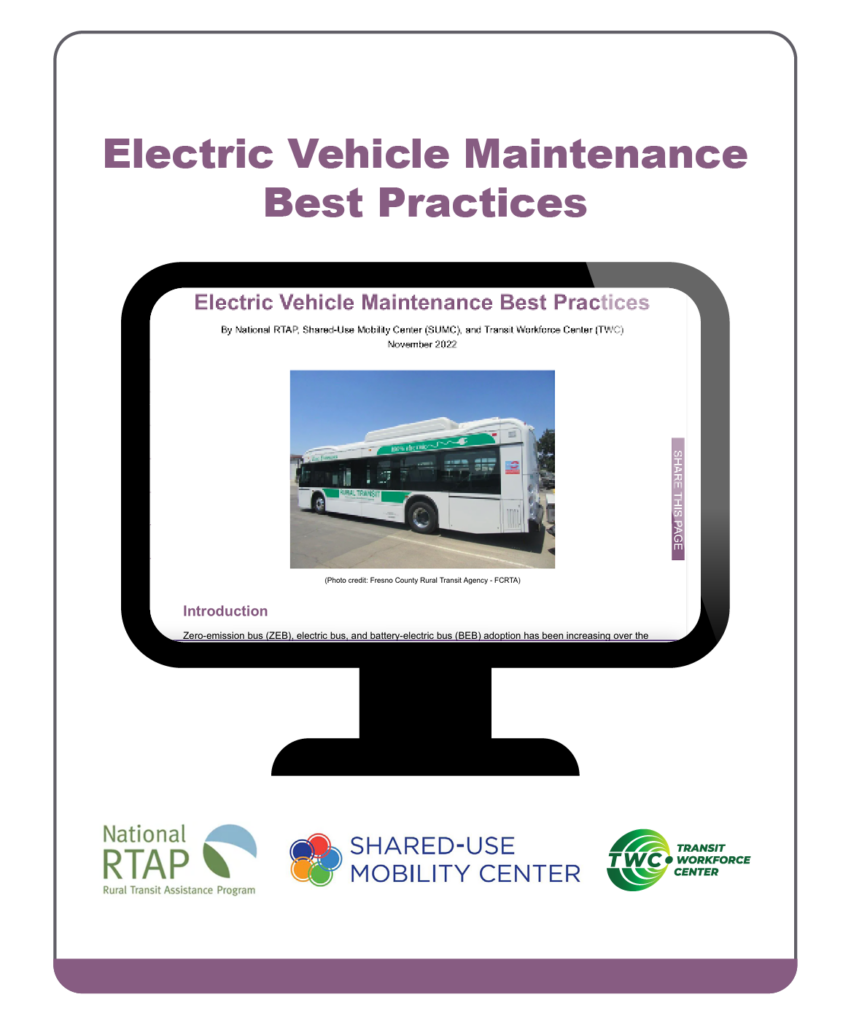
Electric Vehicle Maintenance Best Practices
This best practice spotlight article on electric vehicle maintenance provides recommended practices and case studies from transit agencies that have successfully implemented these vehicles into their fleets.
National RTAP, Shared-Use Mobility Center (SUMC), and Transit Workforce Center (TWC)
November 2022
TOPICS: Safety and Health , Training , Zero Emission Buses
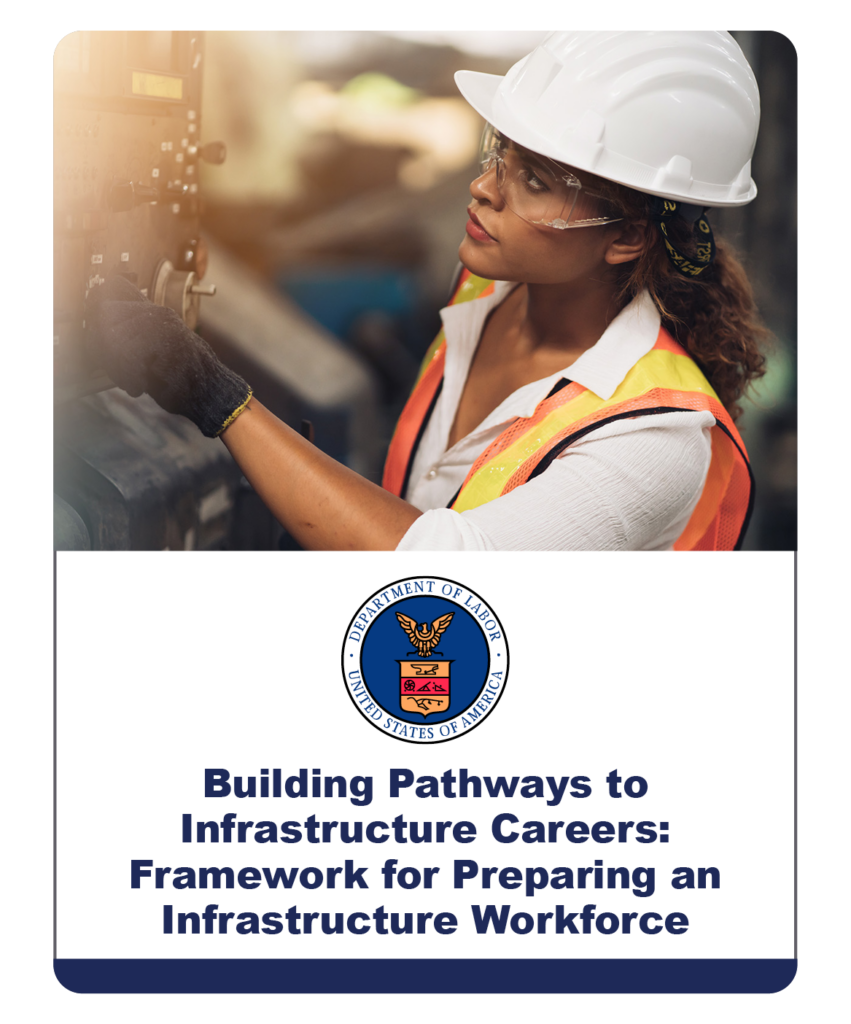
Building Pathways to Infrastructure Careers: Framework for Preparing an Infrastructure Workforce
This resource provides a framework for all workforce stakeholders, including infrastructure project leads, to engage the public workforce system in implementing the Bipartisan Infrastructure Law with strong workforce commitments and proven strategies that produce high-quality education, training, and employment opportunities for all workers.
U.S. Department of Labor, Employment and Training Administration
October 2022
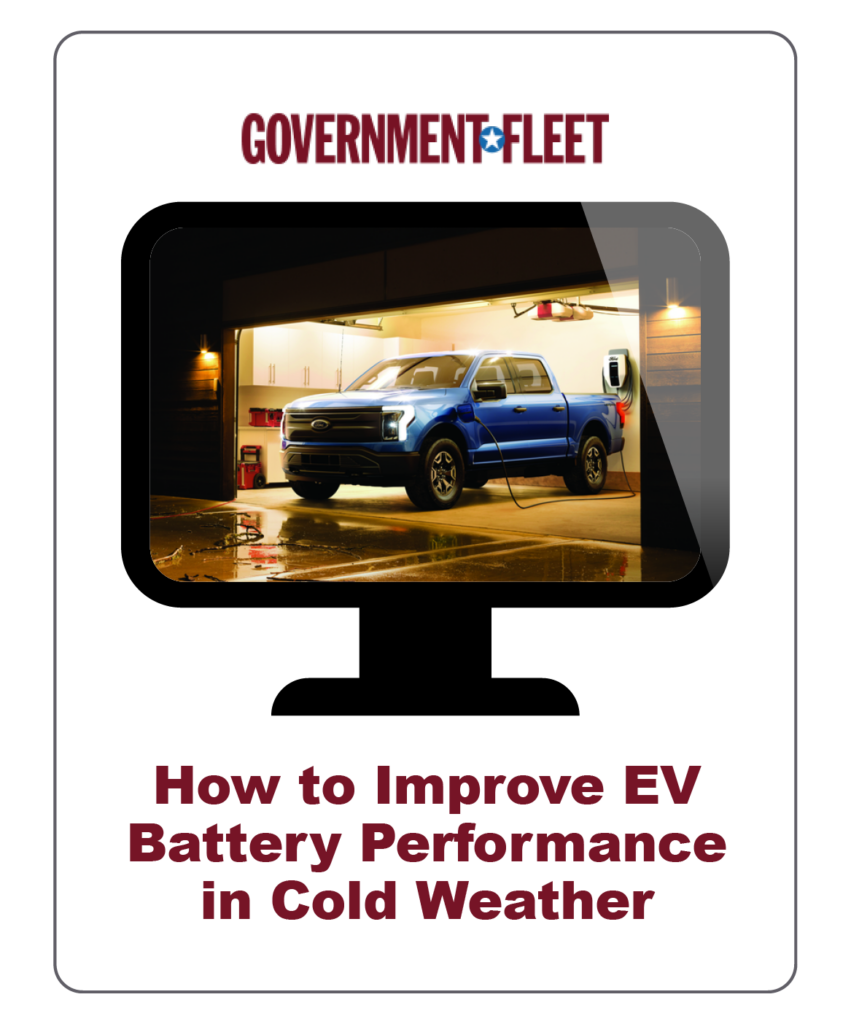
How to Improve EV Battery Performance in Cold Weather
This article provides advice and recommendations to transit agencies for maintaining electric vehicle battery performance in cold weather.
Government Fleet
July 2022
TOPICS: Zero Emission Buses
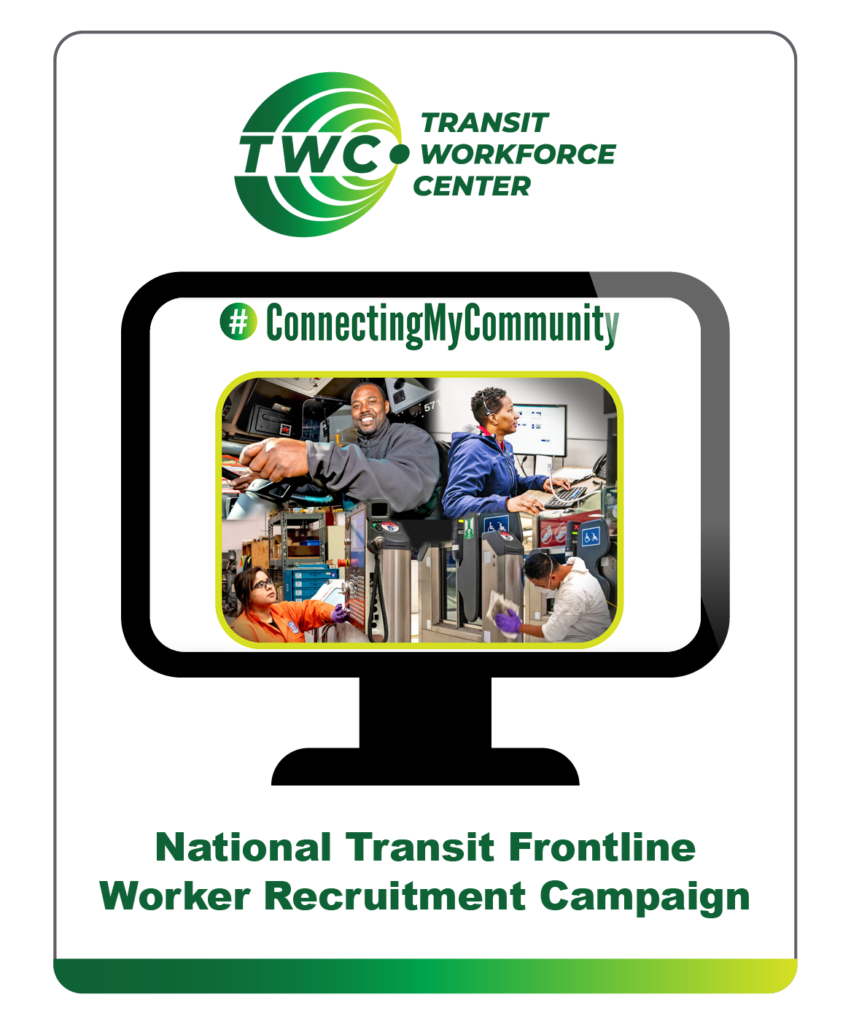
National Transit Frontline Worker Recruitment Campaign
Across the United States, whether large, small, urban, rural, or tribal, transit agencies are facing the challenge of recruiting and retaining drivers, mechanics, and technicians who can operate and maintain the buses of our public transit systems. To help support local transit efforts, TWC is developing the #ConnectingMyCommunity national frontline worker recruitment campaign, coordinated with the Federal Transit Administration (FTA) and industry, labor, and community partners from around the country.
Transit Workforce Center
July 2022
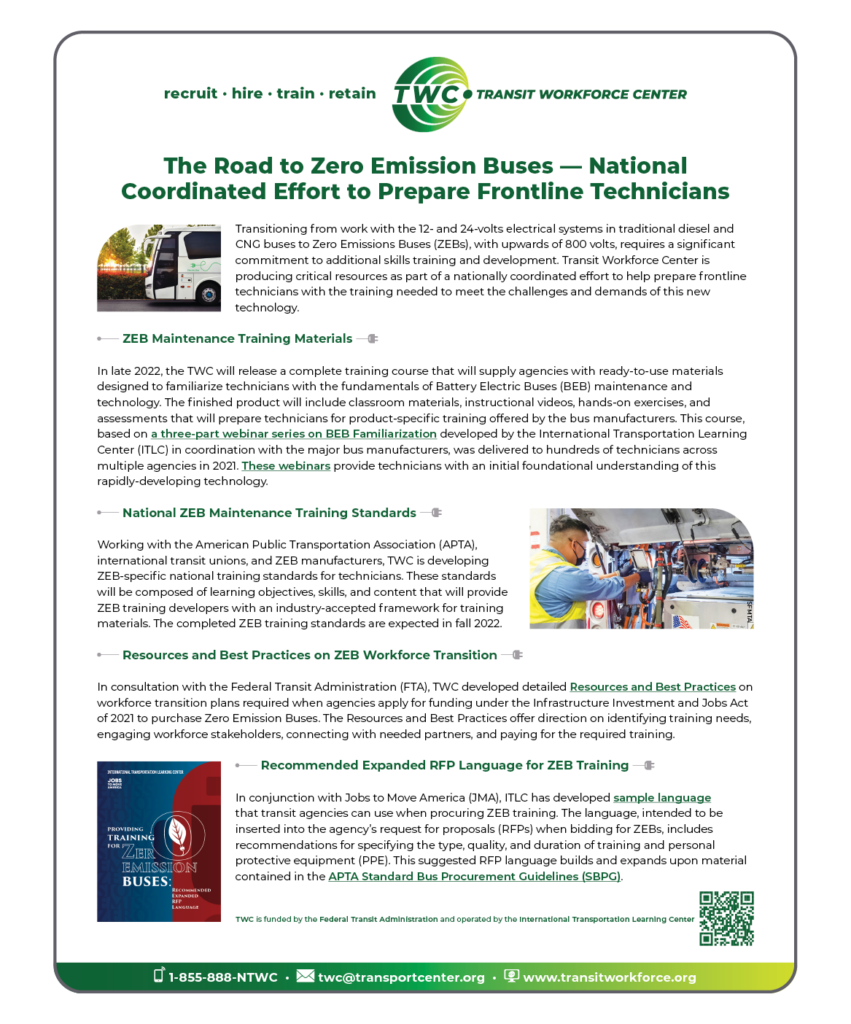
The Road to Zero Emission Buses — National Coordinated Effort to Prepare Frontline Technicians
Transit Workforce Center
March 2022
TOPICS: Hiring and Recruitment , Policy and Planning , Procurement , Training , Zero Emission Buses
Transitioning from work with the 12- and 24-volts electrical systems in traditional diesel and CNG buses to Zero Emissions Buses (ZEBs), with upwards of 800 volts, requires a significant commitment to additional skills training and development. The Transit Workforce Center is producing critical resources as part of a nationally coordinated effort to help prepare frontline technicians with the training needed to meet the challenges and demands of this new technology. This document summarizes our ZEB resources.
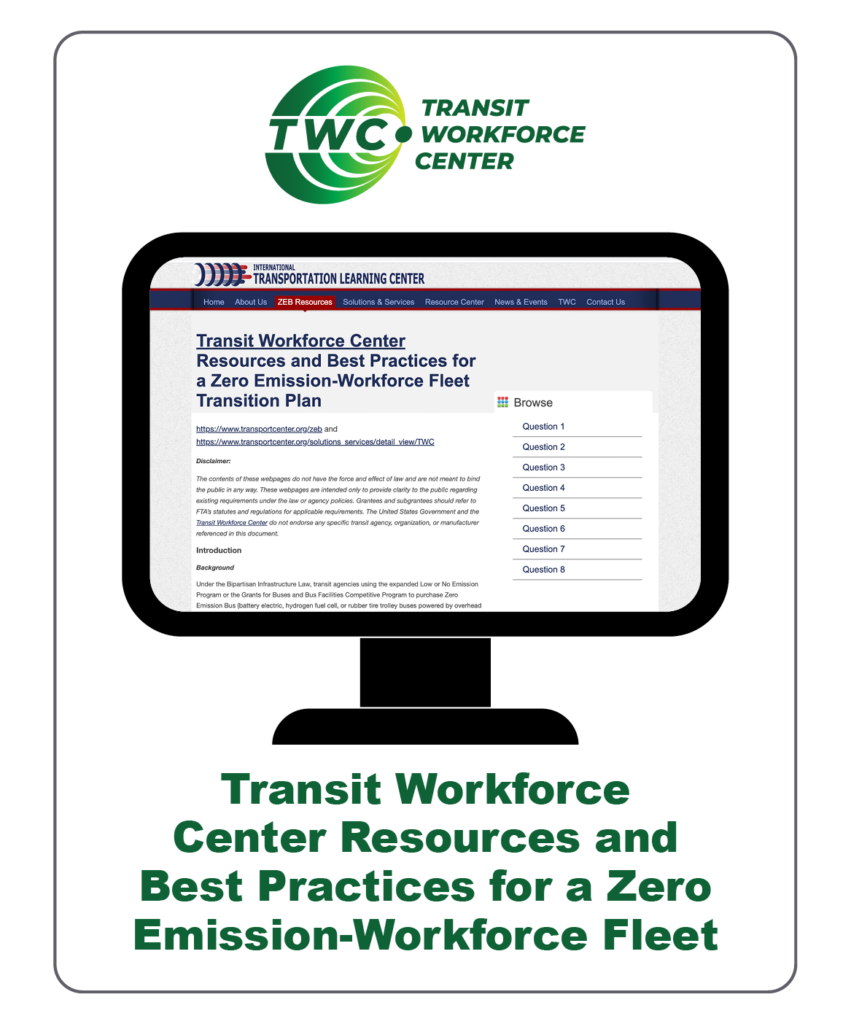
Transit Workforce Center Resources and Best Practices for a Zero Emission-Workforce Fleet Transition Plan
A supplemental resource to aid agencies seeking to develop and implement a carefully planned joint labor-management workforce strategy for the transition to a zero-emission fleet in partnership with its workforce. Examples of best practices, lessons learned, and other resources are provided to help transit agencies examine and address their workforce needs and are not intended to be all-inclusive given the unique circumstances of that transit agencies face.
Transit Workforce Center
March 2022
TOPICS: Policy and Planning , Procurement , Zero Emission Buses
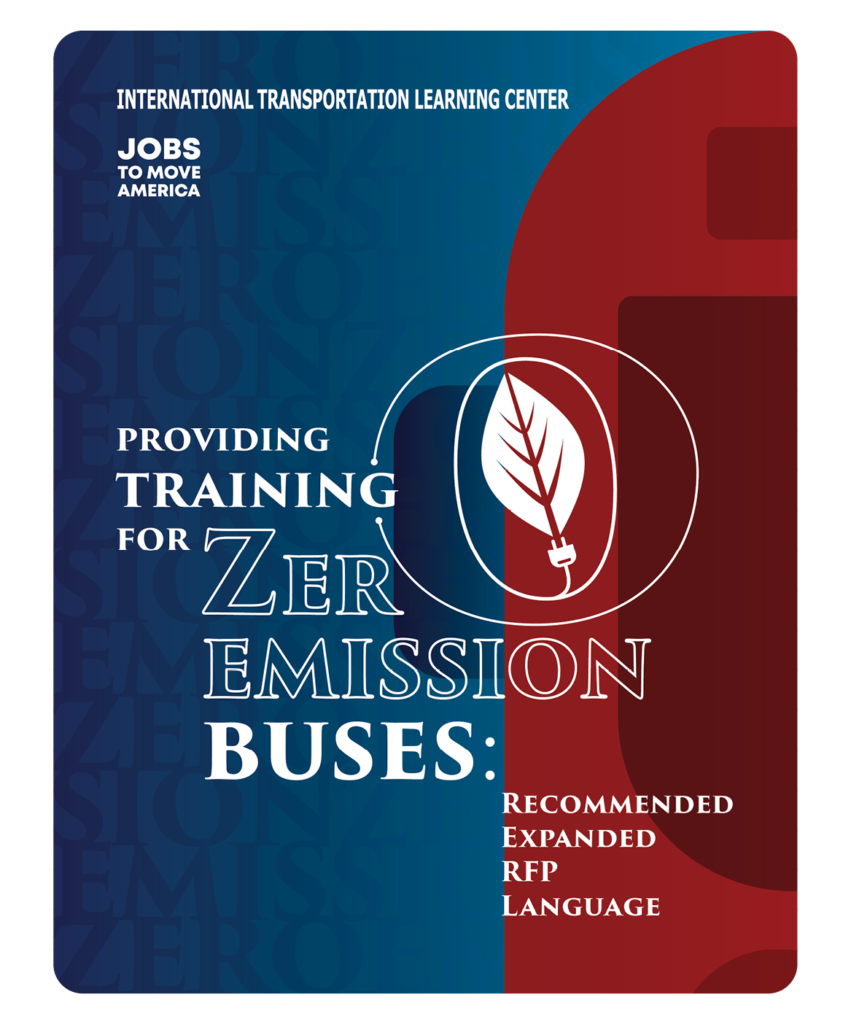
Providing Training for Zero Emission Buses: Recommended Expanded RFP Language
This document includes recommended language for agencies to build robust training procurement into their ZEB Request for Proposals. It is intended to be used as a starting point for agencies to tailor their training procurement to suit their specific needs.
International Transportation Learning Center; Jobs to Move America
February 2022
TOPICS: Procurement , Training , Zero Emission Buses
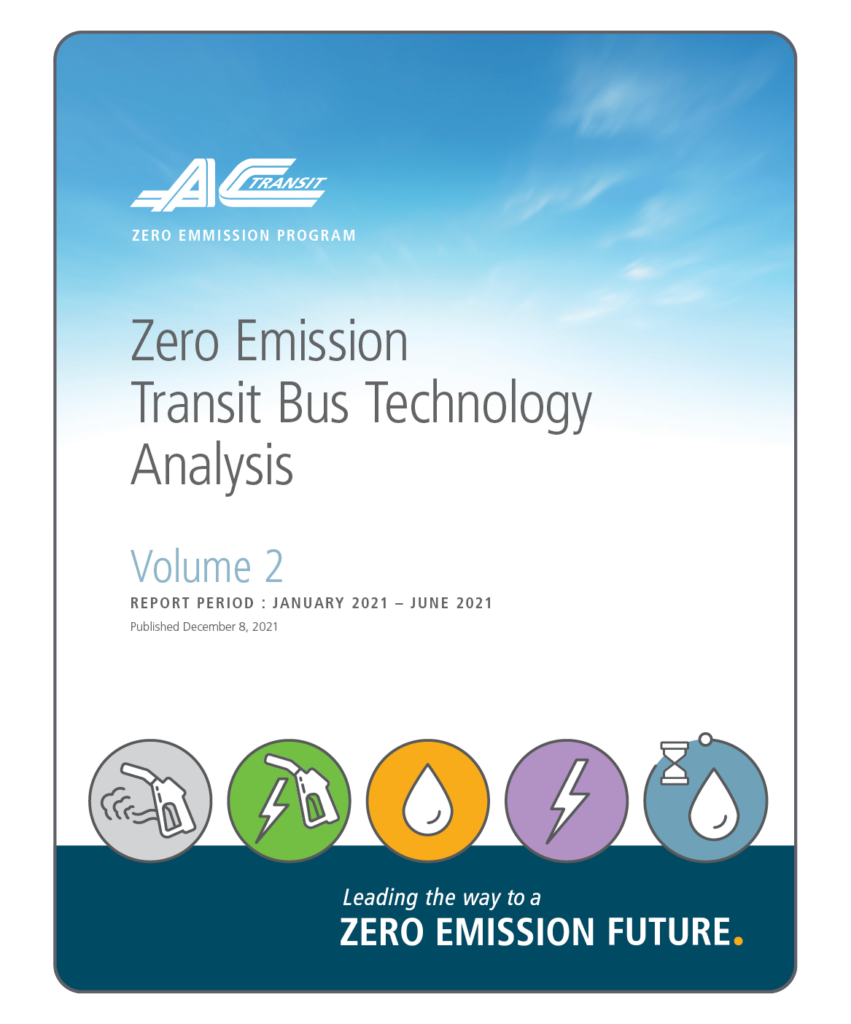
Zero Emission Transit Bus Technology Analysis Volume 2
This report, Volume 2, is the second edition of the Zero Emission Transit Bus Technology Analysis (ZETBTA) which includes results from the fuel-cell electric bus (FCEB), battery electric bus (BEB), diesel hybrid bus, and conventional diesel bus technologies control fleet. It integrates lessons learned and best practices gleaned from AC Transit’s extensive experience in deploying ZEB technologies, including developing innovative workforce training programs, data integration and management, and transit deployment viability.
AC Transit
December 2021
TOPICS: Procurement , Training , Zero Emission Buses
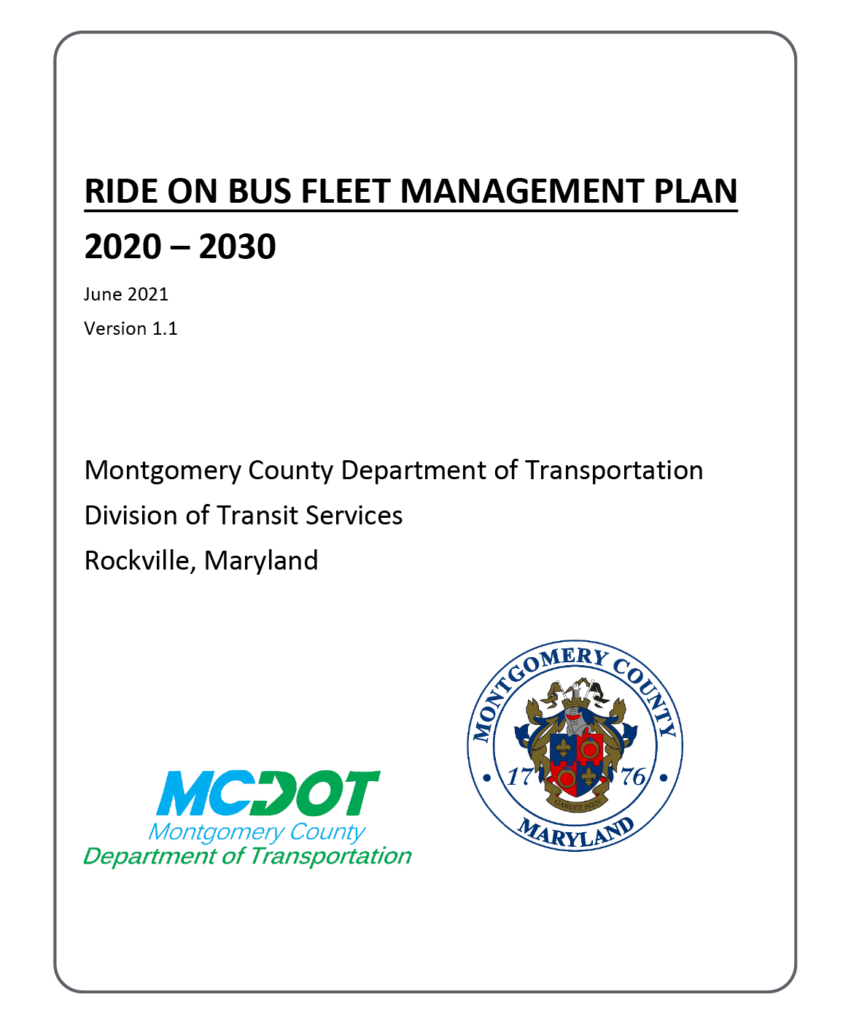
Montgomery County Bus Fleet Management Plan
The Montgomery County Bus Fleet Management Plan features a particularly in-depth zero-emission fleet transition plan, including an assessment of greenhouse gas emissions in the county, implementation challenges associated with zero-emission buses, and recommendations for fleet transition. The plan also dives into maintenance facilities, energy costs, and future infrastructure needs.
Montgomery County Department of Transportation
June 2021
TOPICS: Policy and Planning , Zero Emission Buses
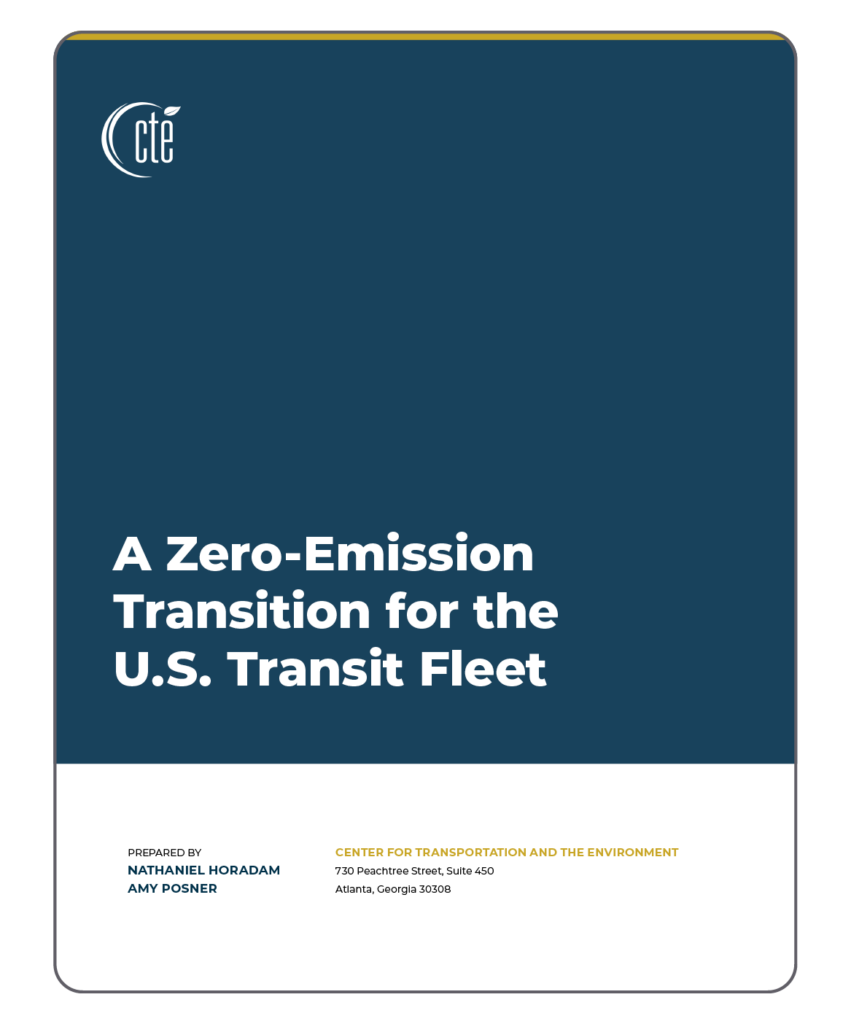
A Zero-Emission Transition for the U.S. Transit Fleet
This report offers a roadmap for federal lawmakers in support of making a complete transition to zero-emission vehicles in transit, including an accounting of estimated agency costs, key assumptions underpinning those figures, acknowledgement of limitations, and workforce development considerations.
Center for Transportation and the Environment
May 2021
TOPICS: Policy and Planning , Procurement , Training , Zero Emission Buses
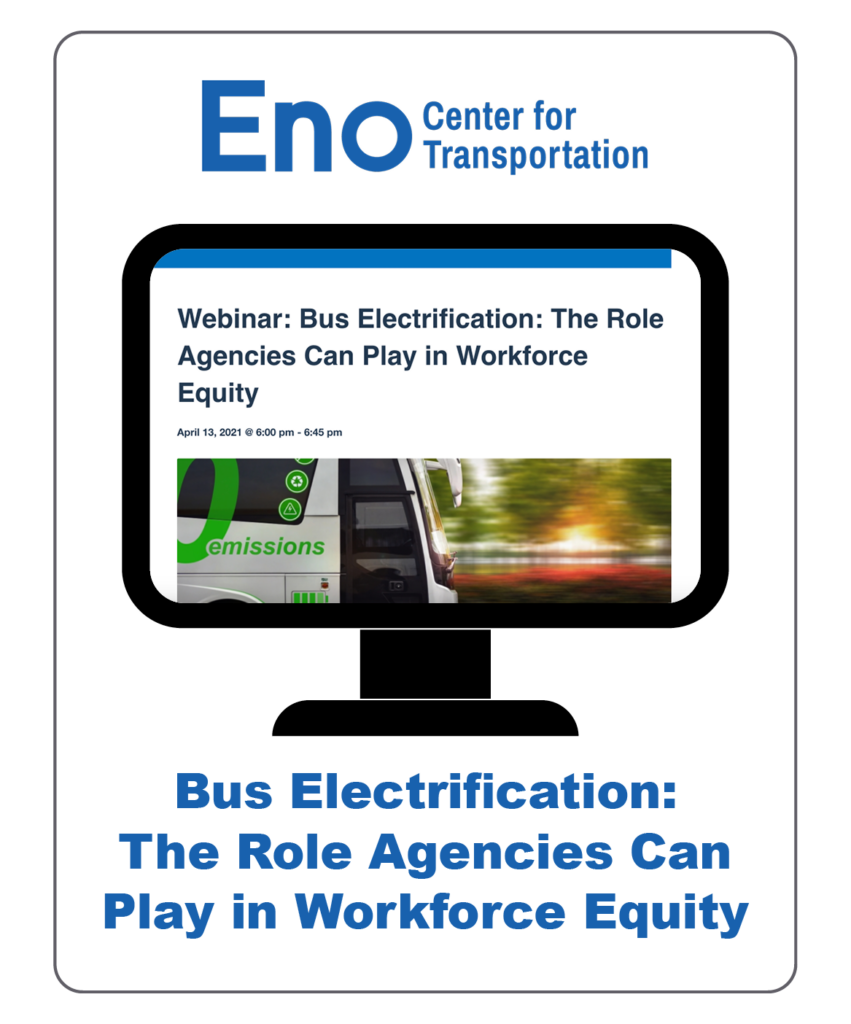
Bus Electrification: The Role Agencies Can Play in Workforce Equity
In this webinar, speakers discuss the issues of procurement, manufacturing, job creation, and job equity associated with fleet electrification.
Eno Center for Transportation
April 2021
TOPICS: Policy and Planning , Procurement , Retention , Zero Emission Buses
Speakers:
- Christy Veeder, PhD, National Program Director, Jobs to Move America
- Brianne Eby, Senior Policy Analyst, Eno Center for Transportation
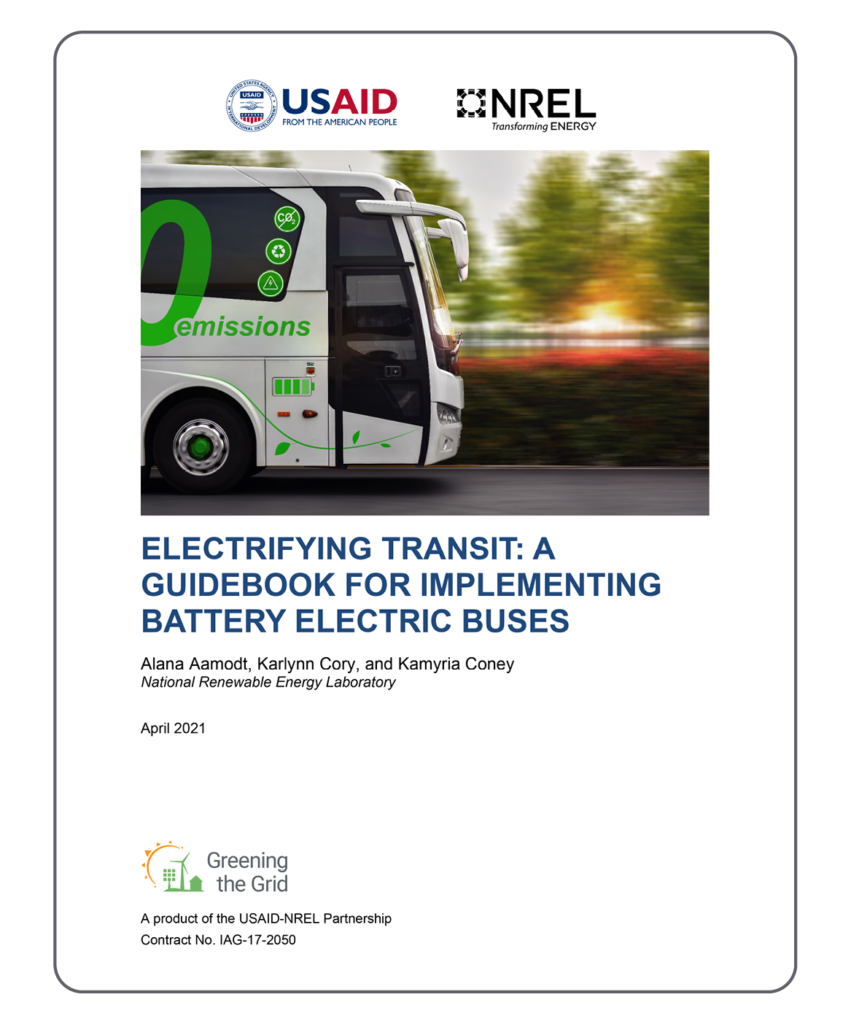
Electrifying Transit: A Guidebook for Implementing Battery Electric Buses
This guidebook assists stakeholders with interest in deploying battery-electric buses by describing decisions and considerations required for successful BEB implementation. It includes information about the benefits and barriers of BEBs, BEB basics, charging infrastructure, operation and maintenance, and costs.
United States Agency for International Development; National Renewable Energy Laboratory
April 2021
TOPICS: Procurement , Zero Emission Buses
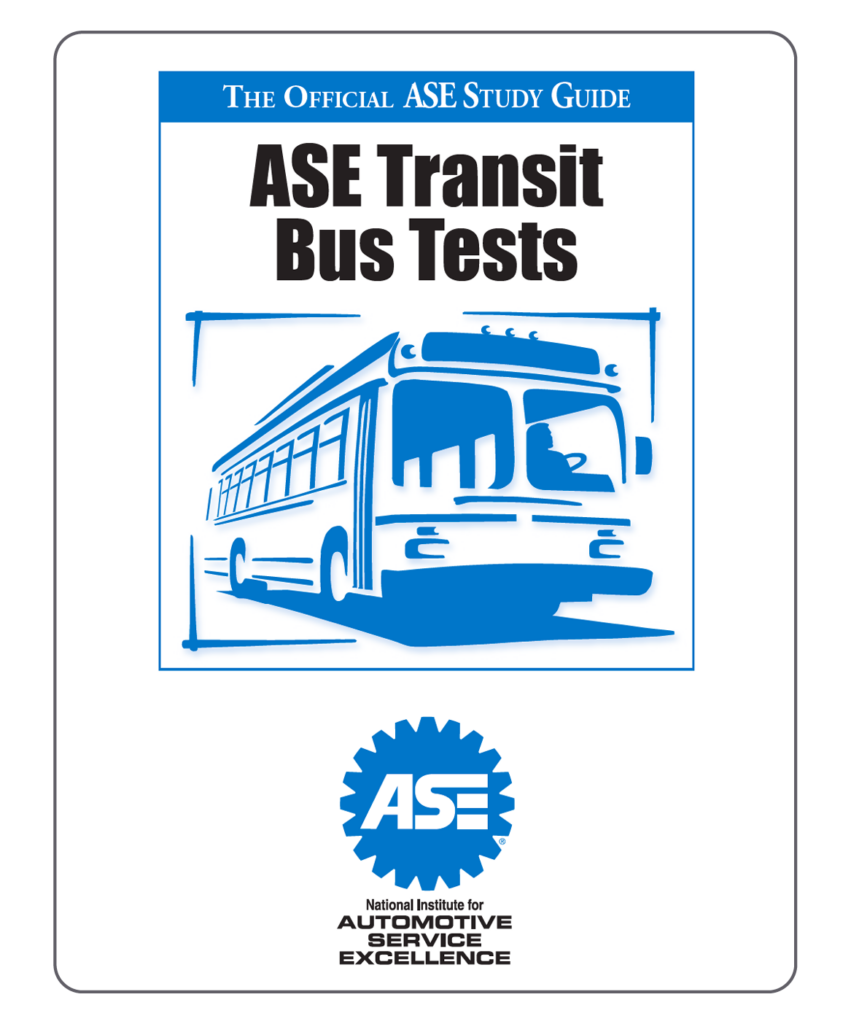
ASE Transit Bus Test Study Guide
The Official ASE Study Guide for Transit Bus Tests is designed to help technicians prepare for the ASE certification tests, which identify and recognize those Transit Bus Technicians who demonstrate knowledge of the skills necessary to diagnose, service, and repair various systems on transit buses.
Automotive Service Excellence (ASE)
January 2021
TOPICS: Safety and Health , Training , Zero Emission Buses
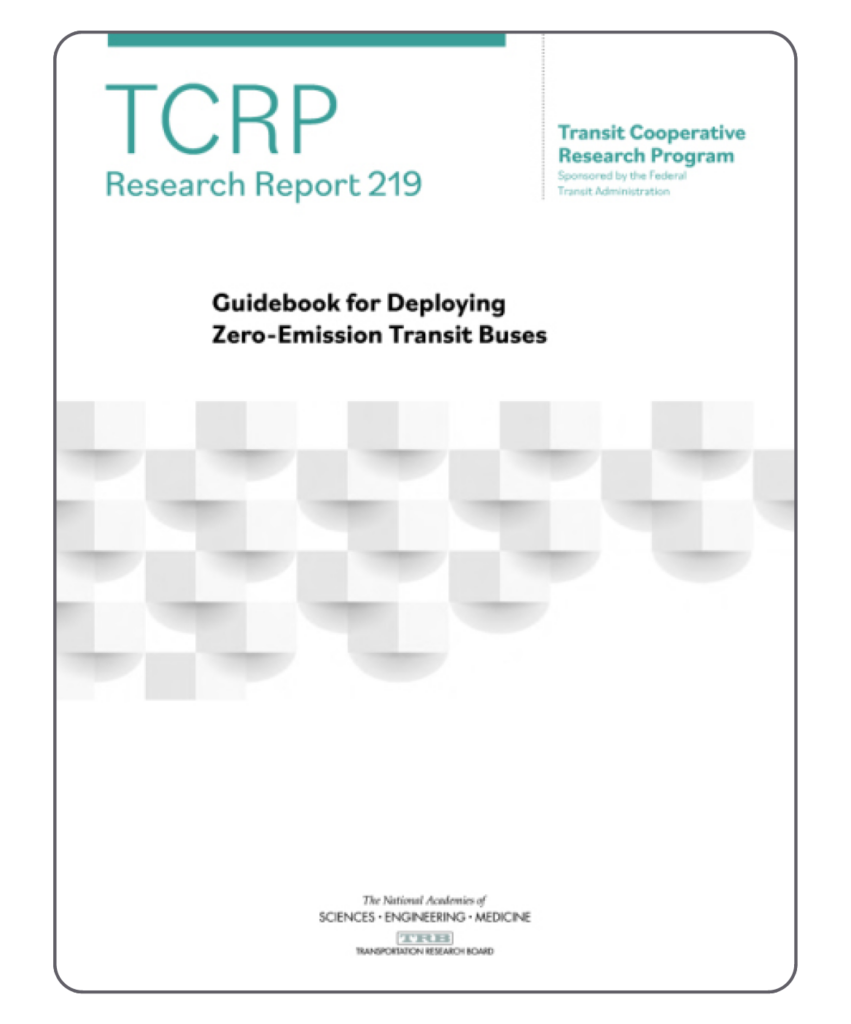
Guidebook for Deploying Zero-Emission Transit Buses
The TCRP Research Report 219: Guidebook for Deploying Zero-Emission Transit Buses is designed to provide transit agencies with information on current best practices for ZEB deployments and lessons learned from previous deployments, industry experts, and available industry resources.
Transportation Cooperative Research Program
January 2021
TOPICS: Policy and Planning , Procurement , Zero Emission Buses
Contributor(s): National Academies of Sciences, Engineering, and Medicine; Transportation Research Board; Transit Cooperative Research Program; Meredith Linscott; Amy Posner
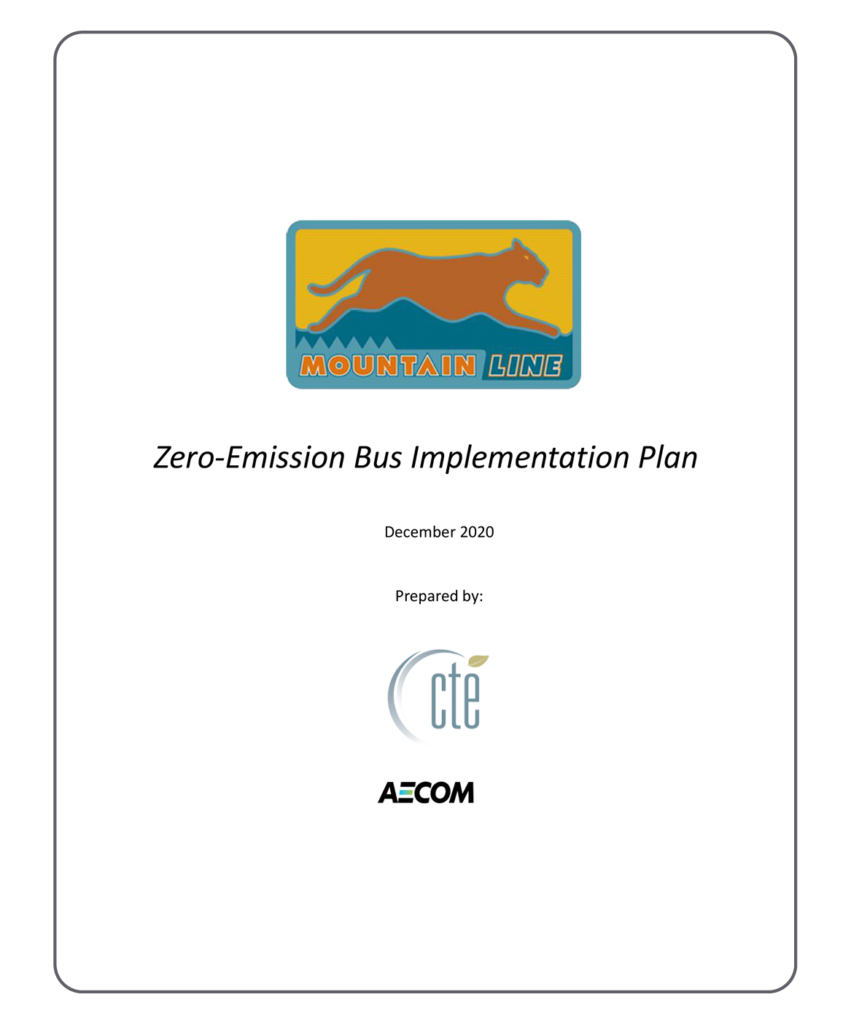
Mountain Line Zero-Emission Bus Implementation Plan
This is the Zero Emission Bus (ZEB) Implementation Plan prepared by the Northern Arizona intergovernmental Public Transportation Authority (referred to as Mountain Line) in contract with the Center for Transportation and the Environment (CTE) with the aim of identifying a zero-emission roadmap for full-scale deployment.
Center for Transportation and the Environment; AECOM
December 2020
TOPICS: Procurement , Safety and Health , Training , Zero Emission Buses
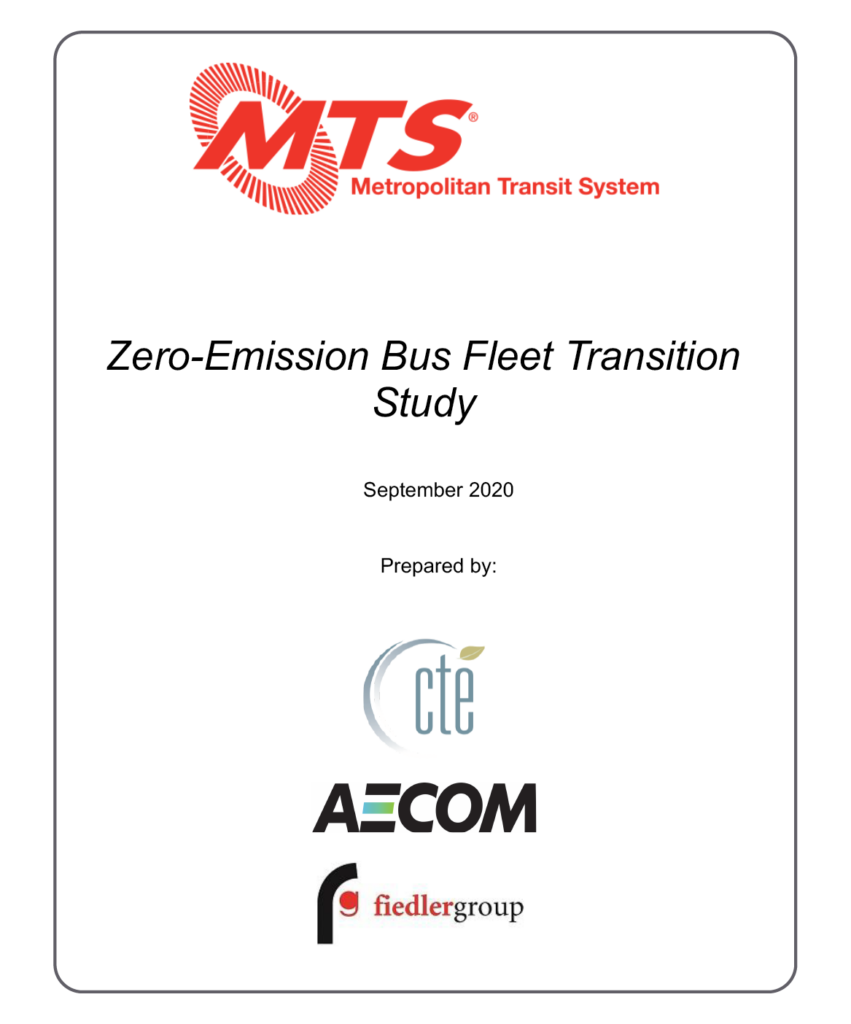
MTS Zero-Emission Bus Fleet Transition Study
This study, performed by the Center for Transportation and the Environment (CTE) for the San Diego Metropolitan Transit System (MTS), creates a plan for a 100% zero-emission fleet by 2040 to be in compliance with the Innovative Clean Transit (ICT) regulation enacted by the California Air Resources Board (CARB). The results of the study will be used to inform MTS Board members and educate MTS staff of estimated costs, benefits, constraints, and risks to guide future planning and decision making.
Center for Transportation and the Environment; AECOM; Fiedler Group
September 2020
TOPICS: Policy and Planning , Zero Emission Buses
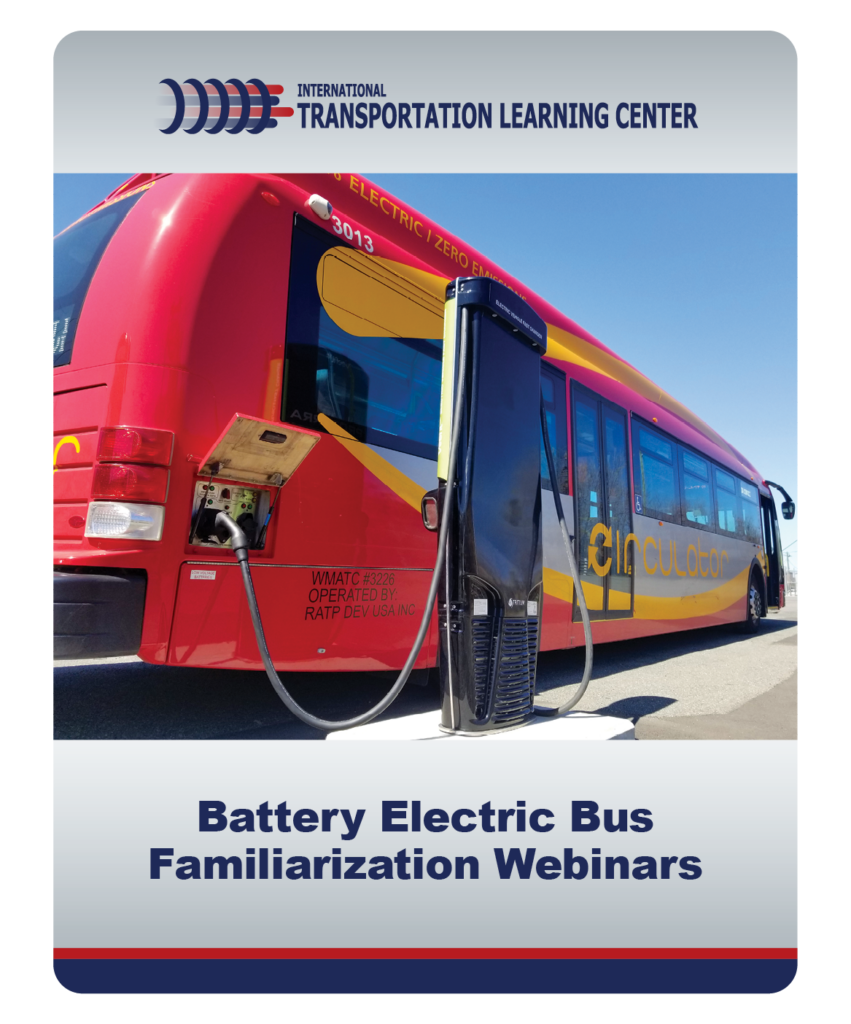
Battery Electric Bus Familiarization Webinars
The International Transportation Learning Center presents three distance-based courses to help transit bus technicians gain fundamental understanding of battery electric bus (BEB) technology. These courses are recorded from live online sessions.
International Transportation Learning Center
June 2020
TOPICS: Safety and Health , Training , Zero Emission Buses
In each session, experts from various BEB manufacturers presented on specific topics, with over 400 participants attending. Each session is introduced by John Schiavone, who moderated many questions from participants. Please click through the drop-down options below to view the recorded sessions, slides and presenters’ notes, and sample tests and test answers.
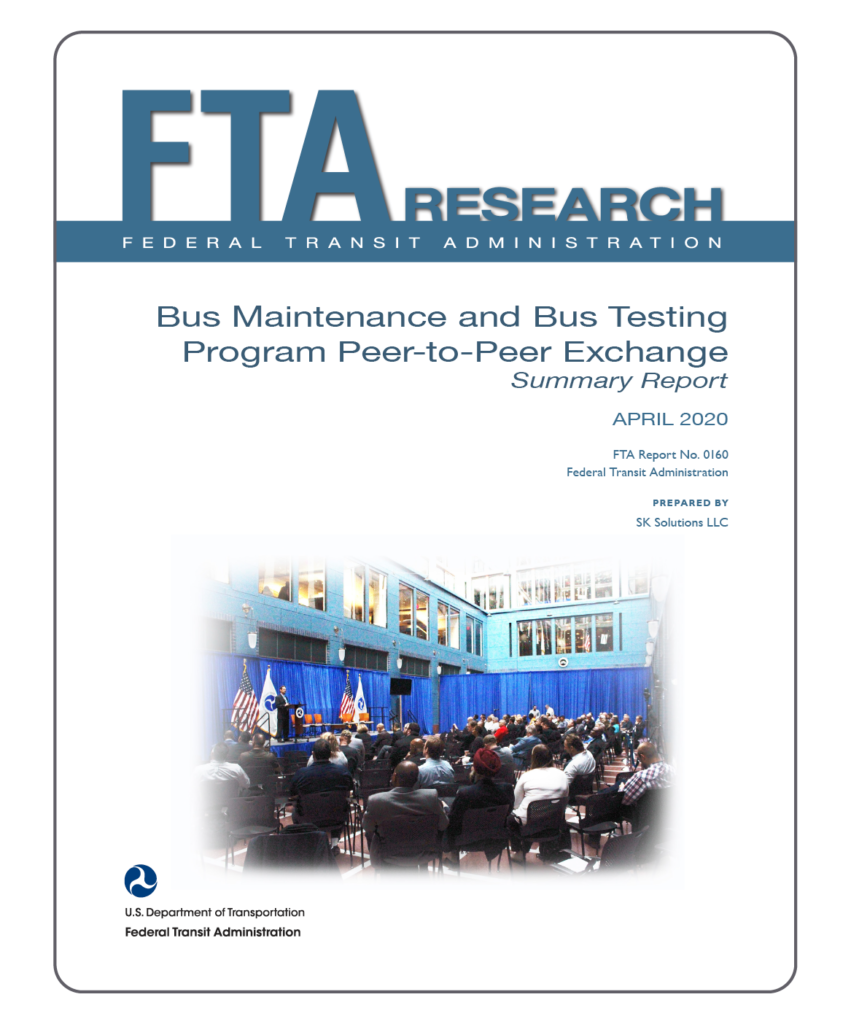
Bus Maintenance and Bus Testing Program Peer-to-Peer Exchange
This report presents a summary of the bus maintenance worker training peer exchange, hosted by the Federal Transit Administration (FTA). Significant shifts in the types of transit buses being procured (e.g., from traditional buses to alternative fuel/low- and no-emission buses) require new and different types of frontline worker training. Through the peer exchange, stakeholders, including industry representatives, shared knowledge about bus maintenance worker training and discussed best practices for developing the next generation of highly-skilled bus technicians.
Federal Transit Administration
May 2020
TOPICS: Hiring and Recruitment , Policy and Planning , Procurement , Training , Zero Emission Buses
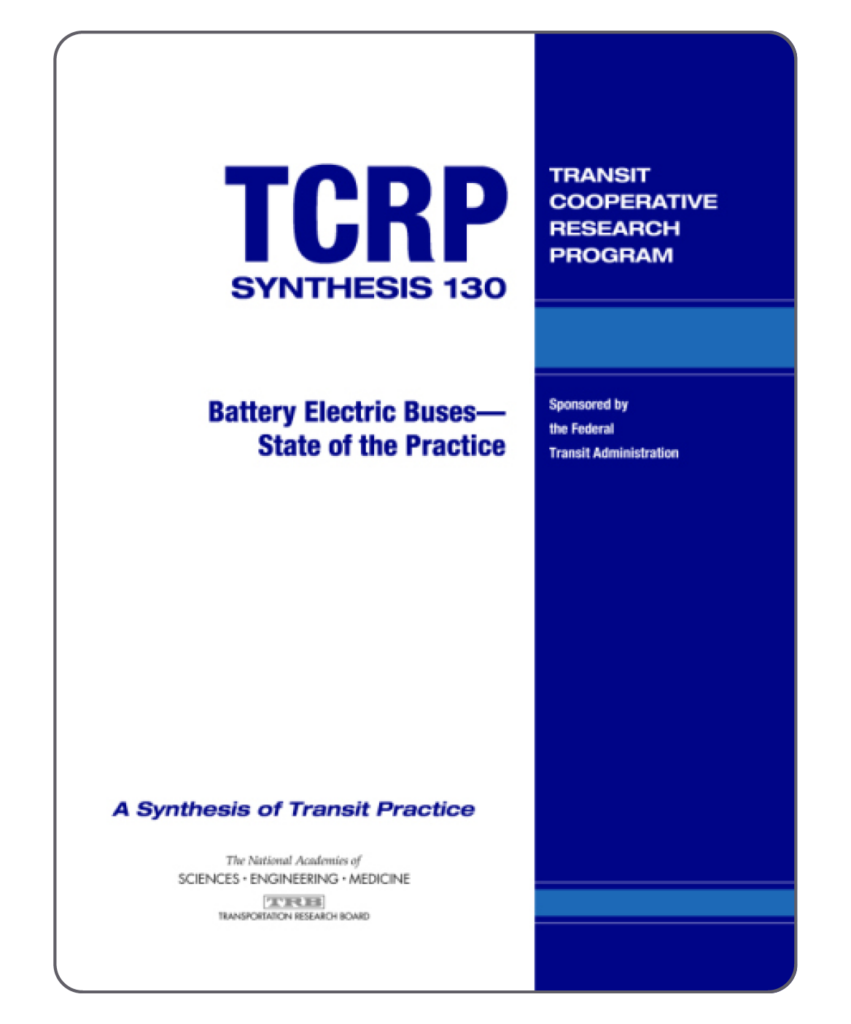
Battery Electric Buses—State of the Practice
This report documents current practices of transit systems in the planning, procurement, infrastructure installation, operation, and maintenance of battery electric buses (BEBs). The synthesis is intended for transit agencies that are interested in understanding the potential benefits and challenges associated with the introduction and operation of BEBs.
Transit Cooperative Research Program
March 2018
TOPICS: Procurement , Zero Emission Buses
Contributor(s): National Academies of Sciences, Engineering, and Medicine; Transportation Research Board; Transit Cooperative Research Program Synthesis Program; Synthesis Program; Transit Cooperative Research Program; Jason Hanlin; Darby Reddaway; Julia Lane
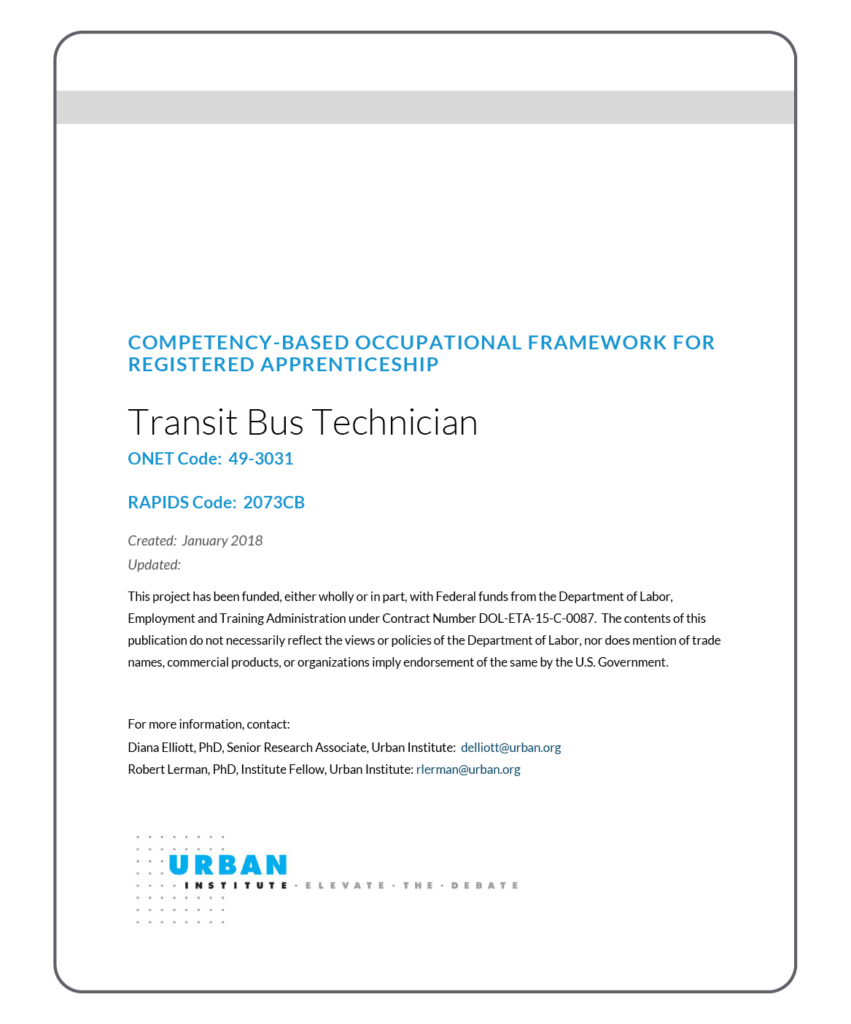
Bus Maintenance Apprenticeship Framework
The Bus Maintenance Apprenticeship Framework was developed by the National Bus Maintenance Apprenticeship Committee and approved by the U.S. DOL. It is a competency based framework that includes all of the tasks an apprentice should be able to demonstrate as a result of the training. Tasks are based on the ASE task list and APTA training standards. It is only a guide, locations can add or remove tasks to suit their individual operations.
The framework spreadsheet was developed by ITLC as a more in-depth and customizable version of the Bus Maintenance Apprenticeship Framework. Note the various tabs at the bottom for each Job Function.
International Transportation Learning Center; The Urban Institute
January 2018
TOPICS: Apprenticeship , Training , Zero Emission Buses
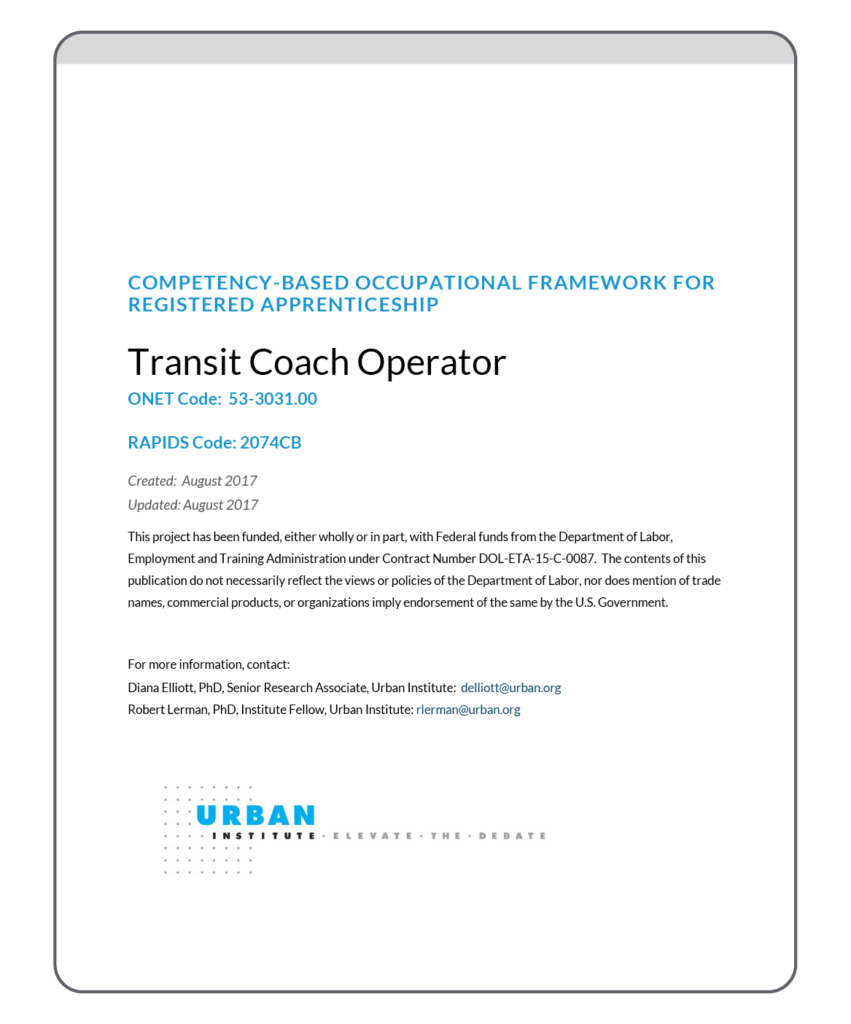
Transit Coach Operator Competency-Based Framework
This is the full Competency-Based Occupational Framework for Registered Apprenticeship for transit coach operator/bus operators.
The Urban Institute & International Transportation Learning Center
August 2017
TOPICS: Apprenticeship , Training , Zero Emission Buses
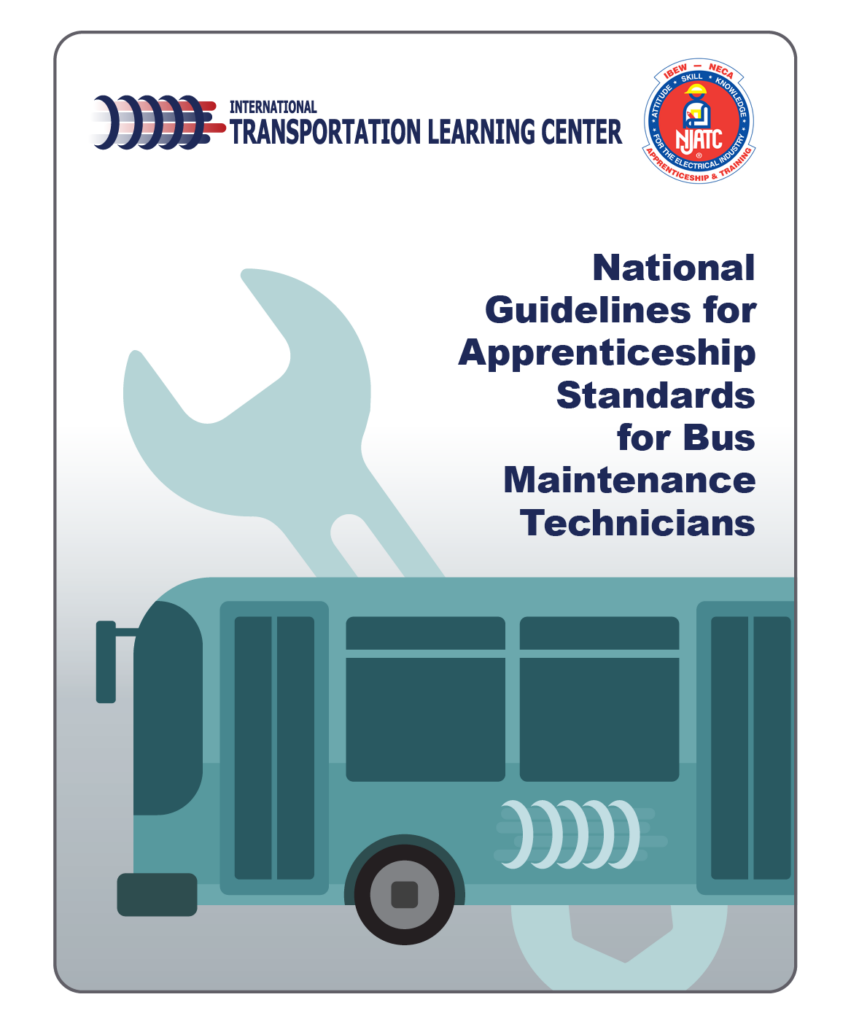
National Guidelines for Apprenticeship Standards for Bus Maintenance Technicians
These National Joint Apprenticeship and Training Committee (NJATC) Apprenticeship Standards have as their objective the training of Bus Maintenance Technicians skilled in all phases of bus maintenance. The NJATC and its affiliated Local Joint Apprenticeship and Training Committees recognize that in order to accomplish this, there must be well-developed on-the-job learning combined with related instruction. This recognition has resulted in the development of these Apprenticeship Standards.
Developed by the Intl. Transportation Learning Center and National Joint Apprenticeship and Training Committee (NJATC) in cooperation with the U.S. Department of Labor, Office of Apprenticeship.
Approved and certified by the U.S. Department of Labor, Office of Apprenticeship on 8/25/2010.
International Transportation Learning Center & National Joint Apprenticeship and Training Committee (NJATC)
August 2010
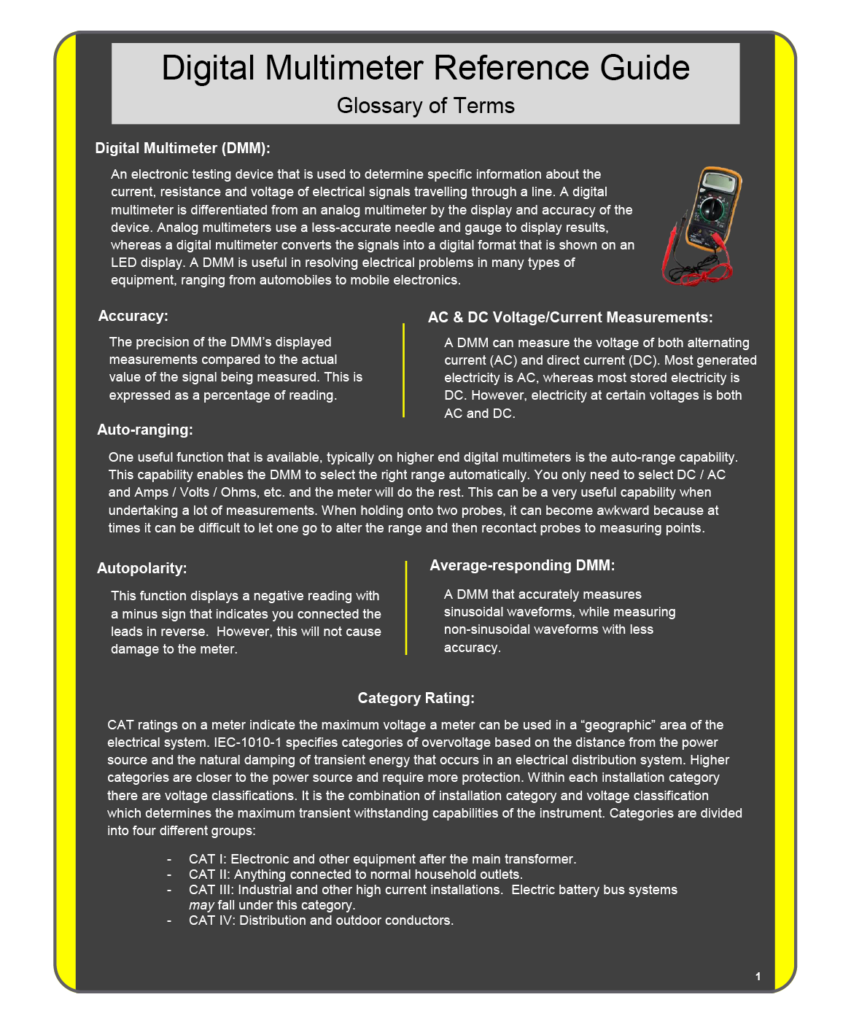
Digital Multimeter Reference Guide
This reference guide explains how to use a digital multimeter, including glossaries, safety precautions, and related resources.
International Transportation Learning Center
TOPICS: Training , Zero Emission Buses
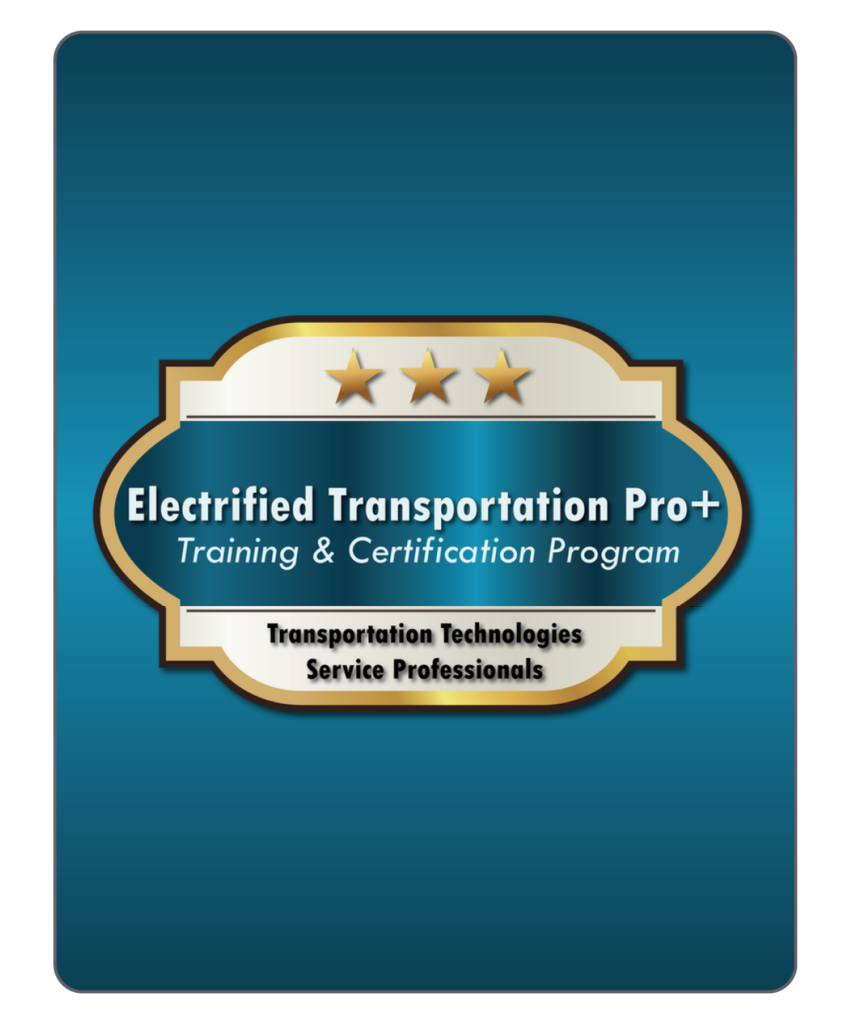
Electrified Transportation Pro+ Training and Certification Program
The objective of the Electrified Transportation Pro+ program is to ensure that all individuals across all transportation industries are trained in Electrified Vehicle Systems and Technologies consistently to one standard. The training is completed in preparation to perform the practical and written exams for earning the corresponding Level 1, Level 2, and Level 3 Certifications.
Electrified Transportation Pro+
TOPICS: Safety and Health , Training , Zero Emission Buses
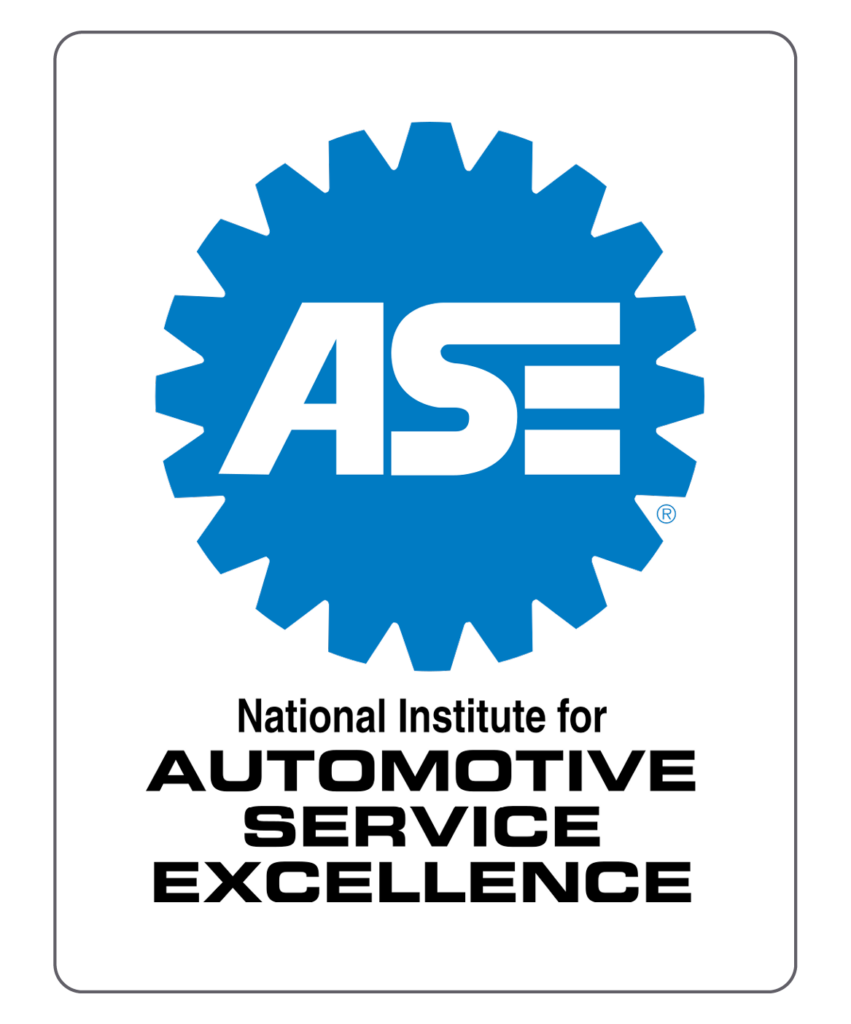
Transit Bus Certification Tests
This Test Series identifies and recognizes Transit Bus Technicians who demonstrate knowledge of the skills necessary to diagnose, service, and repair various systems on transit buses. Technicians can use the Official ASE Study Guide for Transit Bus Tests to prepare.
Automotive Service Excellence
TOPICS: Safety and Health , Training , Zero Emission Buses
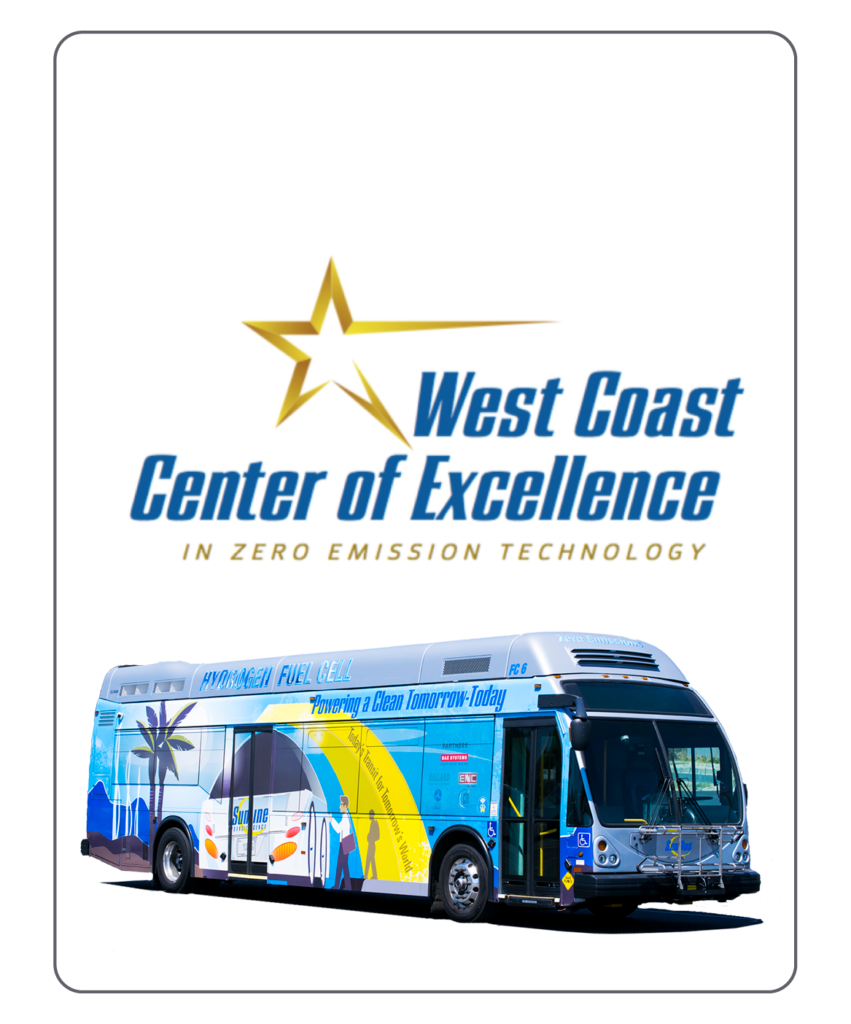
West Coast Center of Excellence in Zero Emission Technology
SunLine Transit Agency’s West Coast Center of Excellence in Zero Emission Technology (WCCOE) is a workforce development program focused on deploying and operating zero emission buses in public fleets. Funded by the FTA, this center provide training, best practice information and access to technology and software geared towards the planning, procurement and deployment of zero emission buses.
SunLine Transit Agency
Course offerings include:
• Leadership and Employee Relations
• Zero Emission Bus Overview
• Zero Emission Bus Operations
• Zero Emission Bus Maintenance
• Financial Management
• Zero Emission Bus Procurement
• Zero Emission Bus Policies and Regulations
• Planning for ZEB Operation







